#replies:{Chronicles of A Holy Knight}
Explore tagged Tumblr posts
Note

"Saph you just said... "i love you."

“I—I mean t-that is to say!! M-maybe??? I’m…oh, it’s getting warm in here! Ahahahaha…”
Well, it just had to happen sooner or later, didn’t it? The inevitable all teenage youths wish to avoid when it comes to confronting the focus of their affections. What surprised Sapphire mostly was how well Hotaru seemed to have taken the confession. In his mind, he’d be picturing her blowing her tsundere gasket; lecturing him about having an elementary school crush on her. Although it seems as if she was a bit curious herself to know the reasoning behind his sentimental declaration.
He continues by absent-mindedly fiddling with the locket that hung around his neck. “I mean…..okay not so maybe but….possibly yes I do….have feelings for you.”
Sapphire slowly turns his head to meet Hotaru’s gaze, his green eyes softened. A holy light shined from his mystical art, indicating that his feelings were indeed genuine no matter his protests.
“And if I were to describe these feelings….p-possible feelings, mind you! I would say that it’s mostly because you are so, so very brave. And you’re warm…and smart…and being with you whether it’s fighting on the field or indulging in whatever little moments we’re given….it’s a blessing for me. My home. I haven’t seen it in a year, Hotaru, and I don’t even know what damage I’ll return to. But you’ve made this a home for me in the crappiest of circumstances. I love you because you’re comforting to be around.”
He undoes the locket around his neck, holding it out to her as a gift of gratitude. It previously held a picture of his mother holding a newborn him. Whether Hotaru would take it or leave it didn’t worry him. Sapphire just wanted her to know his raw emotions.
“I love you so much Hotaru! You are my very best friend that I treasure.”
1 note
·
View note
Text
“What are you--?”
It flashed by so quick like an invisible bullet. Sapphire was fast, but not enough to predict the powerful throw from landing an impact at his head hard, causing it to bleed a little and leave a bruised mark. For the first time in a long time, he was experiencing a rare occurence in which he was caught off guard.
“Ow! Damn it!!”
He closed his eyes, holding his hand where Nanami’s ball landed. A glare. That was confirmation enough to him that she was not to be easily convinced to drag herself out of such a spiraling situation. And if that was the case? He would have no other choice than to level with her the same way they did once the fight started with their mg forms. Normality, be damned. However, the forest and tavern brawls exposed him to enough of the mundane to allow him to get down and dirty.

“....Eat dirt, stray cat.”
Sapphire doesn’t hesitate to lunge forward and winds up a powerful to aim dirt and rocks in Nanami’s face.
silverhearted-robin-hood:

“You know I WANT to understand you. I don’t pity you. I just FEEL whether you want to believe me or not!”
His heart faintly glowed as his mind replayed the last moments his mother was alive. The thousands of lives who suffered from the consequences of his father’s own buffoonery made him feel physically ill. —
{Don’t hate your father. He means well. And you will be a great warrior. Perhaps greater than him. But don’t make it wholly who you are. You are more than just a child of the sacred dragon or the heir of Silverland; you are my miracle who will carve your own path. Farewell, my love. I am a mother first before I am a queen.}
{Mother no!! Don’t leave me! He’ll kill you! Don’t hurt yourself for our sake!!!}
—
“You’re right. We’re not so different. I’ve had to skirt the edge of the law to provide for my people. Do some things I’m not proud of. I suppose you could say at some point, the dark was very tempting to give into.”
Sapphire shyly rubs his arm, balling up his other hand into a fist. His eyes sharpened into cat-like irises boring into Nanami’s darker shades.
“You were made a promise and it was broken. You lost not only one but two lives in the process. And for that I am sorry. I’m aware it isn’t enough and will never be hearing these words from an outsider.” He bowed his head. A common gesture from this country, right? He did so for a few seconds before standing his ground once more. He had to remember that Nanami was not his friend nor an ally for that matter. She couldn’t care for him nor his words. He did have a warning, however.
“But I very much doubt Miss Umi would be pleased if you allowed yourself to fall further. She must’ve been a good sister. You are doing a disservice to her if you do this! She would hate to see you in such a state if it meant forfeiting your soul! You’re neglecting her and yourself!”
A cold wind filled the air. The back alleys of Furuzeki were always this way, as if inviting conflict at any given time. This night would be no different. Sapphire was the unstoppable force, while Nanami was the immovable object. He may have lifted one curse, but he could not lift a heart that did not want to be opened.
“Don’t you dare bring her into this conversation! You are just as stupid as Hotaru! Shut up with your grandstanding words!”
Nanami would be the one to start the fight. The little bastard was going down one way or another. No one ever talked about Umi to her, as if they knew her. The fire had been started by an energy of the sun. Hotaru had been at the sight. That was all Nanami needed to know. Now this brat, being the red heads new side kick was going to suffer the same beat downs.

“Go fetch. Dog.” Nanami said as she grabbed the nearest object near her.
It was not going to be kendo staff or even a real weapon. Just a simple piece of garbage. A worn down hardball. With quick reflexes she tossed the ball at an unbelievable speed.
27 notes
·
View notes
Text
I was thinking about how Margaret Holland's Book of Hours has the arms of Clarence impaling Holland on the same page as an illumination depicting the Arrest of Christ, with both Christ's face and the heraldic shield showing signs of touching/kissing leading Jessica Barker to conclude that Margaret may have seen Thomas Duke of Clarence's violent death as an "echo" of Christ's suffering. Then I remembered two things.
Firstly, that Thomas died on Holy Saturday - the day between Good Friday and Easter Sunday, when the Harrowing of Hell occurred - so the connection with this imagery is very fitting.
Secondly, according to two chronicles, the English defeat at the Battle of Bauge (and thus Thomas's death) occurred due to the treachery of one André Lombart (or Andrew of Lombardy), which is striking when coupled with the manuscript folio.
The first chronicler who mentions this is John Strecche, whose chronicle was written in 1426. He writes:
Consider then that a certain soldier, Andrew of Lombardy, who had one time been a mercenary with the duke of Clarence, and had stolen a quantity of loot from the town of Pontoise, as I have three chapters before this, with a strong hand and cunning treachery, rose up and attacked them all, devoid of any any help. And he murdered the Duke and captured and killed the others at Eastertide in the year of the Incarnation of Our Lord 1421.
The second account comes from Peter Basset and Christopher Hanson, who were writing for Sir John Fastolf and whose account covers the years 1415 to 1429. They give more detail, writing:
The latter [Thomas Duke of Clarence] spoke with André Lombart, who was a traitor twice over, and enquired what power the enemy had and what number they were. Lombart replied that the enemy were only in small number and were not strong enough to acquit themselves even against half of the power of my lord of Clarence, and that he would therefore have a very fine and honourable victory. My lord of Clarence, thinking that the traitor was telling him the truth, gave orders for the deployment of the archers of his company, to wit, Sir [blank], Sir [blank] knights of Portugal, captains of Fresnay-sur-Sarthe, and with them, the bastard of Clarence, and told them to await him in the said location of Beaufort until his return, telling them also that he wished that the other nobles and himself should have the honour of the destruction (of the French). But it turned out quite the opposite, for which reason there was much sadness and sense of loss. My lord of Clarence and the nobles of his company, passing through narrow pathways, encountered the enemy already in battle formation, thanks to the warning of the aforementioned traitor Lombart who had sold the duke. They had set up significant ambushes by their men to prevent the duke and his company escaping without being killed or taken prisoner. The enemy immediately overran the duke on all sides. The duke and his nobles defended themselves as valiantly as they could, but finally my lord of Clarence was pitiously killed and several other lords were taken prisoner or killed.
The predominant narrative of the Battle of Bauge is that of disaster caused by Thomas's reckless rush to battle, this is true in the vast majority of accounts and in historians' coverage of the battle. For John D. Milner, Strecche's account is the "most creative" of English attempts to obscure the role of "English negligence" in the defeat, particularly Thomas's:
Frank Taylor in his edition of the chronicle has commented that Strecche transforms Baugé into an incident of comparatively little significance, thus attempting both to reassure those in England when they heard about it and to preserve Clarence’s reputation. As C. L. Kingsford observed, this must have been some early rumour of the affair which reached England, and in which the truth was concealed.
Milner does find more support for the Lombart story, noting that first (i.e. "Lancastrian") edition of John Hardying's chronicles contains a reference to "‘counsayll of Andrew, fals Lombarde". Milner ultimately concludes:
It is at least possible that such an account became current, and then remained long in the collective memory, in an attempt to mitigate the culpability of the royal commander, Clarence. It is interesting, however, that the authors of the Historia Anglicana and the Vita et Gesta Henrici Quinti make no reference to Andrew Lombard. This suggests that this episode was not known to them and that, if known, it was discounted or that, of itself, it did no credit to the English side.
Given the Vita et Gesta Henrici Quinti is believed to have been commissioned by Sir Walter Hungerford, who had close connections with Henry V, it is perhaps telling that it makes no reference to the Lombart story.
Whether or not it is true, however, what strikes me is the way we can couple the story of Thomas being betrayed to his death with the folio in his wife's Book of Hours which seems to link his death with Christ's betrayal. Even if the story isn't true (which does seem to be the consensus of historians), then I wonder if it's possible Margaret Holland believed it?
References
Jessica Barker, Stone Fidelity: Marriage and Emotion in Medieval Tomb Sculpture (The Boydell Press, 2020)
Anne Curry and Rémy Ambühl, A Soldiers' Chronicle of the Hundred Years War: College of Arms Manuscript M 9 (D. S. Brewer 2022)
Geoffrey Hilton, A Biography of King Henry V Told by John Strecche, Canon of Kenilworth 1426 (2014)
John D. Milner, “The Battle of Baugé, March 1421: Impact and Memory”, History, Vol. 91, No. 4, October 2006
#thomas duke of clarence#margaret holland duchess of clarence#the battle of bauge#blog#i just have so many thoughts and feelings right now#also ask me about my tinhat conspiracy about the battle of bauge
9 notes
·
View notes
Text
Worst Video Game Song Tournament Masterpost
The tournament has begun! We are currently in round 4, and each poll will be open for a week. I will also be reblogging each poll 12 hours after it is posted so that people in different time zones are able to see them more easily. If you don't want to see these reblogs, block the tag #12th hour reblog. There will be a total of 8 polls in this round. 4 polls will be posted a day for a total of 2 days.
When you vote, I would recommend listening to as much as you can of each song before voting, but how you choose is up to you. Remember to be civil in the tags and replies! Some posts will have propaganda included with the songs, but feel free to add more propaganda in the tags and replies, or send it to me in the ask box and I'll try to share it as soon as I can!
View the bracket, make predictions and more on Challonge here
View the spreadsheet of submissions here
View the original introduction post here
Read the FAQ here
Listen to the full playlist on YouTube here
Full list of polls under the cut:
Round 1
Match 1 - Lavender Town (Pokémon Red/Blue) vs. Vs. Odd Yo-Kai (Yo-Kai Watch)
Match 2 - K.K. Synth (Animal Crossing New Leaf) vs. Bad Feeling (Mad Rat Dead)
Match 3 - This is Where You Are Caucasian Destination Boy (Project Sekai: Colorful Stage! feat. Hatsune Miku) vs. Morpho Knight (Kirby and the Forgotten Land)
Match 4 - Track 6 (The Ring: Terror's Realm) vs. Fallen Down (Undertale)
Match 5 - Rodeo Time! (Yo-Kai Watch 3) vs. The Fade (Dragon Age Origins)
Match 6 - Rivers in the Desert (mito Remix) (Persona 5 Dancing in Starlight) vs. Birthday Cake (Jet Set Radio Future)
Match 7 - Let's Start the Killing Game (Danganronpa v3: Killing Harmony) vs. You've Got to Eat Your Vegetables! (Commander Keen 4)
Match 8 - Venus (Doom Troopers Sega Genesis) vs. GB Hunter Theme (GB Hunter)
Match 9 - Know What I Mean? (Mario Party 2) vs. Boss Theme 1 (Sonic Superstars)
Match 10 - Area 4, 8, & 13 (Santa Claus Saves the Earth GBA) vs. The Yoshi Clan (Yoshi's New Island)
Match 11 - Bomb Rush Blush (Remix) - Splatoon 2 vs. Mansion Basement (Resident Evil Director's Cut)
Match 12 - Monkeys (Nancy Drew: Ransom of the Seven Ships) vs. Vacation Music 1 (The Sims 1)
Match 13 - Hazy Lane (Yo-Kai Watch 3) vs. Central City (Sonic Chronicles: The Dark Brotherhood)
Match 14 - Mumble Blues (Armed and Delirious (Dementia)) vs. Crazy Bus Title Screen (Crazy Bus)
Match 15 - Striptease (Persona 4) vs. Professor Birch's Laboratory (Pokémon Omega Ruby/Alpha Sapphire)
Match 16 - Oppression (Cave Story) vs. Spookwave (Undertale)
Match 17 - Nocturne (Sonic Chronicles: The Dark Brotherhood) vs. Ancient Chozo Ruins (Metroid II: Return of Samus)
Match 18 - Diggity Dog (WWF No Mercy N64) vs. YZAP (Yo-Kai Watch 3)
Match 19 - Versus (Sonic Eraser) vs. Neo-Opportunist (Mad Rat Dead)
Match 20 - 50m (Donkey Kong '94) vs. Black Tar (Xenoblade Chronicles X)
Match 21 - Shadow World (DE DE MOUSE Remix) (Persona 4 Dancing All Night) vs. Mushroom Road (Tales of the Abyss)
Match 22 - Fest Zest (Splatoon 2) vs. Survival Instincts Kicking In (Bravely Default II)
Match 23 - Drawbridge Dilemma (WarioWare: Get it Together!) vs. Fight Theme 1 (Omikron: The Nomad Soul)
Match 24 - Thrifty Megamart (Pokémon Sun/Moon) vs. Metal Gear MS DOS Soundtrack (Metal Gear MS DOS)
Match 25 - NLA (Night) (Xenoblade Chronicles X) vs. Spooktune (Undertale)
Match 26 - Namco Arcade 80's Retro Medley (Super Smash Bros. for Wii U) vs. I Love Beijing Tiananmen (Hong Kong 97)
Match 27 - Stage Theme (1942) vs Red-Green-Yellow-Yellow (Mother 3)
Match 28 - Din's Power (Harp) (The Legend of Zelda: Skyward Sword) vs. Wildfire (Honkai: Star Rail)
Match 29 - Midna's Lament (Remix) (Super Smash Bros. Ultimate) vs. Tired of Life (Lady of Beestmeel Bro)
Match 30 - Holy Orders? (Guilty Gear XX) vs. Burning Men's Soul (Persona Trinity Soul)
Match 31 - Built to Scale (Rhythm Heaven Fever) vs. Main Theme (Beverly Hills Cop)
Match 32 - Just Leave Me Alone (OMORI) vs. Denegul (Lagoon)
Match 33 - Now or Never! (Remix) (Super Smash Bros. Ultimate) vs. Crown Dungeon (The Legend of Zelda: Oracle of Ages)
Match 34 - Heart and Soul (Cutscene) (Sonic Frontiers) vs. Dungeon Man (EarthBound)
Match 35 - Resetti's Theme (Animal Crossing: Wild World) vs. Rise & Shine, Ursine! (Danganronpa v3: Killing Harmony)
Match 36 - Belly Flop (Splatoon 3) vs. Lemon Jelly (The Sims 2)
Match 37 - mmm yess put the tree on my pizza (Pizza Tower) vs. The Moving Gigantic Ship (Tales of Xillia)
Match 38 - Comin' at ya, My girl (Yakuza 5) vs. Track 7 (Frozen Fruits)
Match 39 - Battle (Field) (The Legend of Zelda: Breath of the Wild) vs. Title Theme (The Adventures of Rad Gravity)
Match 40 - Emphasis on Scat (BattleBlock Theater) vs. Shipwreckin' (Splatoon 2)
Match 41 - Tem Shop (Undertale) vs. Character Select (Marvel vs. Capcom 2)
Match 42 - Title Screen (Tagin' Dragon) vs. Path of Pain (Hollow Knight)
Match 43 - What's Your Name? (San Fransisco Rush) vs. Pathetic House (Undertale)
Match 44 - Mine: Zew (The Void/Tension) vs. Chocobo Theme (Final Fantasy 2)
Match 45 - Versus Giegue (EarthBound Beginnings) vs. Dragon's Den (Pokémon Gold/Silver)
Match 46 - Great Bay Temple (The Legend of Zelda: Majora's Mask) vs. Sagat's Theme (Street Fighter 1)
Match 47 - Chocobo Theme (Final Fantasy X-2) vs. Honeylune Ridge (Super Mario Odyssey)
Match 48 - Close in the Distance (Final Fantasy XIV: Endwalker) vs. Shrimp Shuffle (Rhythm Heaven Fever)
Match 49 - Desert (Super Mario Bros.) (Super Mario Maker 2) vs. National Anthem (Double Dribble Arcade)
Match 50 - Dubble Bath (DIY Remix) (Splatoon 2) vs. Fun House (Spider-Man the Animated Series)
Match 51 - Options (Sonic Spinball) vs. Welcome to Mario Cars 2 (Mario Cars 2)
Match 52 - Twilit Battle (The Legend of Zelda: Twilight Princess) vs. Confusion (Digimon World 3)
Match 53 - 25m (Donkey Kong) vs. Buying Goods at Palmira (Evergrace)
Match 54 - Crazy Shuffle Theme (Action 52) vs. Joke's End (Mario & Luigi: Superstar Saga)
Match 55 - Treasure Caves (Wild Woody) vs. Long Elevator (Undertale)
Match 56 - Conspiracy (わるだくみ) (Muv Luv) vs. Opening (Sonic Blast 3D 5)
Match 57 - Digital Roots (Deltarune Chapter 2) vs. Lying in the Darkness (Tales of Graces)
Match 58 - Victory Road (Pokémon HeartGold/SoulSilver) vs. Title Music (Manic Miner)
Match 59 - Donut Plains (Super Mario Kart) vs. Nightclub (Sabotaged) (Payday 3)
Match 60 - Credtrap (Nancy Drew: Secrets Can Kill) vs. Cole Train Rap (Gears of War)
Match 61 - Tragic Prince (Castlevania: Symphony of the Night) vs. Theme of Stardust (Yakuza 2)
Match 62 - Vital (Fornite) vs. Title Screen (Ballz 3D)
Match 63 - Emblem Engage! (Fire Emblem: Engage) vs. Sub-Tree Area (Kirby Super Star)
Match 64 - Maximum Power (After Burner (Amiga)) vs. Imp's Song (DOOM)
Round 2
Match 1 - Lavender Town (Pokémon Red/Blue) vs. K.K. Synth (Animal Crossing: New Leaf)
Match 2 - This is Where You Are Caucasian Destination Boy (Project Sekai: Colorful Stage! feat. Hatsune Miku) vs. Track 6 (The Ring: Terror's Realm)
Match 3 - The Fade (Dragon Age: Origins) vs. Birthday Cake (Jet Set Radio Future)
Match 4 - You've Got to Eat Your Vegetables! (Commander Keen 4) vs. GB Hunter Theme (GB Hunter)
Match 5 - Know What I Mean? (Mario Party 2) vs. The Yoshi Clan (Yoshi's New Island)
Match 6 - Mansion Basement (Resident Evil Director's Cut) vs. Vacation Music 1 (The Sims 1)
Match 7 - Central City (Sonic Chronicles: The Dark Brotherhood) vs. Title Screen (Crazy Bus)
Match 8 - Striptease (Persona 4) vs. Spookwave (Undertale)
Match 9 - Nocturne (Sonic Chronicles: The Dark Brotherhood) vs. Diggity Dog (WWF No Mercy (N64))
Match 10 - Versus (Sonic Eraser) vs. 50m (Donkey Kong)
Match 11 - Shadow World (DE DE MOUSE Remix) (Persona 4 Dancing All Night) vs. Survival Instincts Kicking In (Bravely Default II)
Match 12 - Fight Theme 1 (Omikron: The Nomad Soul) vs. Metal Gear MS DOS Soundtrack (Metal Gear MS DOS)
Match 13 - NLA (Night) (Xenoblade Chronicles X) vs. I Love Beijing Tiananmen (Hong Kong 97)
Match 14 - Stage Theme (1942) vs. Din's Power (Harp) (The Legend of Zelda: Skyward Sword)
Match 15 - Tired of Life (Lady of Beestmeel Bro) vs. Holy Orders? (Guilty Gear XX)
Match 16 - Main Theme (Beverly Hills Cop (PC)) vs. Denegul (Lagoon(SNES))
Match 17 - Crown Dungeon (The Legend of Zelda: Oracle of Ages) vs. Dungeon Man (EarthBound)
Match 18 - Resetti's Theme (Animal Crossing: Wild World) vs. Belly Flop (Splatoon 3)
Match 19 - The Moving Gigantic Ship (Tales of Xillia) vs. Track 7 (Frozen Fruits)
Match 20 - Title Theme (The Adventures of Rad Gravity) vs. Emphasis on Scat (BattleBlock Theater)
Match 21 - Character Select (Marvel vs. Capcom 2) vs. Title Screen (Tagin' Dragon (NES))
Match 22 - What's Your Name? (San Fransisco Rush) vs. Mine: Zew (The Void/Tension)
Match 23 - Versus Giegue (EarthBound Beginnings) vs. Sagat's Theme (Street Fighter 1)
Match 24 - Chocobo Theme (Final Fantasy X-2) vs. Shrimp Shuffle (Rhythm Heaven Fever)
Match 25 - National Anthem (Double Dribble Arcade) vs. Fun House (Spider-Man: The Animated Series)
Match 26 - Welcome to Mario Cars 2 (Mario Cars 2) vs. Confusion (Digimon World 3)
Match 27 - Buying Goods at Palmira (Evergrace) vs. Crazy Shuffle Theme (Action 52)
Match 28 - Treasure Caves (Wild Woody) vs. Opening (Sonic 3D Blast 5)
Match 29 - Lying in the Darkness (Tales of Graces) vs. Title Music (Manic Miner)
Match 30 - Nightclub (Sabotaged) (Payday 3) vs. Credtrap (Nancy Drew: Secrets Can Kill)
Match 31 - Theme of Stardust (Yakuza 2) vs. Title Screen (Ballz 3D(SNES))
Match 32 - Emblem Engage! (Fire Emblem: Engage) vs. Imp's Song (DOOM)
Round 3
#if you think i should add anything more to this post let me know and i'll think about it!#my posts#worst video game song tournament#not a poll#music poll#music#video games#tournament poll#poll tournament#poll bracket#tumblr poll#tumblr polls#tumblr tournament#tumblr tourney
39 notes
·
View notes
Text
THE BELL OF HUESCA - LA CAMPANA DE HUESCA
The king of Aragon, Alfonso I el Batallador, who died on September 7, 1134, without descendants, bequeathed his kingdoms to the Military Orders (that is, to the order of the Templars, the San Juanistas and the Knights of the Holy Sepulcher of Jerusalem), but no one thought of fulfilling that will. The Aragonese nobles, gathered in Jaca, offered the Crown of the Kingdom to their brother Ramiro, Bishop of Roda Barbastro. Ramiro was celebrating the Nativity of the Virgin in Tierrantona when he received the news of his brother's death the day before, having to occupy the throne. His coronation took place in Zaragoza on September 29, 1134, but with the commitment to return in two years to his ecclesiastical tasks, once the line of succession was secured.
The King, fed up with the excesses and rebellion of the Nobles, tried to take charge of the situation, but he had no idea how to do it; So he dispatched a trusted messenger to the monastery of San Ponce de Tomeras to ask his abbot for advice, with whom he had a deep friendship since his youth, when he took up the habits of a monk there. The messenger arrived at the monastery and quickly asked to be received by the Abbot, to whom he transmitted the King's message. The latter, after a brief thoughtful silence, ordered the messenger to accompany him to the garden. As they walked, and without anyone saying a word, the Abbot was cutting the cabbages (some sources speak of roses) that stood out the most over the others. After the walk, the Abbot turned to the messenger and said:
"Return to my Lord the King, and tell him how much you have seen"
The messenger, astonished at what had happened, mounted his horse and returned to convey the Abbot's message to the King. The monarch, unlike the stunned messenger, did understand what the Abbot meant. Now he knew exactly what he had to do.
Ramiro summoned the nobles to Cortes in Huesca, informing them that he wanted to show them a bell that he had ordered built, the sound of which would be heard throughout the kingdom. The nobles received the news between surprise and mockery, but on the day set there they appeared, curious to contemplate that bell that the King was talking about "let's go see that madness that the King wants to do", says the Chronicle of St. Juan de la Peña (Drafted in the fourteenth century) that the nobles thought. Before starting the Cortes, he invited them to a copious barbecue washed down with abundant good wine to agree on an agenda among all. After dinner, the King was inviting one by one the main members of the nobility to enter the room below the throne to discuss in private with them and show them the famous bell.
The nobles, as they entered, were cut down by six burly mountaineers who promptly decapitated them. Headless bodies were thrown into a corner while heads were arranged in a circle. Fifteen heads were arranged in this way on the ground when he brought in Bishop Ordás de Zaragoza, the main leader of the conspiracies against him. The Bishop, seeing the show, was overwhelmed. The King asked him if he did not think it was the most beautiful bell ever made, and if he believed that something was missing, to which the Bishop, full of terror, replied that nothing was missing. The King then replied:
"Yes, something is missing, and this is the clapper, and to make up for it your head is destined."
Ordás was also beheaded and his head hung from a hook in the middle of the circle formed by the other heads.
Once the bell was finished, the King invited the rest of the nobles to enter with him to admire the bell that he had told them so much about.
"You are going to see the bell that I have melted in the underground to ring for greater glory and strength of Ramiro II! I am certain that its ringing will make you restrained, solicitous and obedient to my commands ”.
The nobles upon entering the room were terrified at what they saw. They understood that they were not dealing with a wimp that they could handle at will, but that Ramiro II had proven to be a strong king who would not hesitate at anything in order to preserve the kingdom of Aragon.
As Aragonese that I am, I believe in the legend of the Bell of Huesca. And as a lover of History I have read that during the Reign of Ramiro II a few Nobles disappear from the documents ……. The room where the events occurred continues to exist, it is part of the Huesca Museum, as it stands next to the old Royal Palace.
Between 1879 and 1880, the painter of Romanticism, José Casado del Alisal painted a huge painting at the Spanish Academy of Fine Arts in Rome that represents the moment when the King discovered the "Bell" to the Nobles. Property of the Prado Museum, the painting has been deposited and has been exhibited in the Huesca City Hall since 1950.
Now you too can have this work of art in your home.
To do this first you need the painting "The Rape of the Sabine Women" by @thejim07.
You can download it HERE.
As always, I have to thank my colleagues @navidesigns and @artyssims for being my guinea pigs as always.
-----------------------------------------------------------------------------------------------------------
Fallecido el 7 de septiembre 1134 el rey de Aragón, Alfonso I el Batallador, sin descendencia, legó sus reinos a las Órdenes Militares (es decir, a la orden de los Templarios, a los Sanjuanistas y a los caballeros del Santo Sepulcro de Jerusalén), pero nadie pensó en cumplir dicho testamento. Los nobles aragoneses, reunidos en Jaca, ofrecieron la Corona del Reino a su hermano Ramiro, Obispo de Roda Barbastro. Ramiro se encontraba celebrando la Natividad de la Virgen en Tierrantona cuando recibió la noticia de la muerte de su hermano el día anterior, teniendo que ocupar el trono. Su coronación tuvo lugar en Zaragoza el 29 de septiembre de 1134, pero con el compromiso de regresar en dos años a sus quehaceres eclesiásticos, una vez asegurada la línea de sucesión. Con un rey inexperto y en apariencia pusilánime los nobles aragoneses pensaron que podrían manejarlo a su antojo.
El Rey, harto de los desmanes y rebeldía de los Nobles trató de hacerse cargo de la situación, pero no tenía la menor idea de cómo hacerlo; así que despachó un mensajero de confianza al monasterio de San Ponce de Tomeras para pedir consejo a su Abad, con el que le unía una profunda amistad desde su juventud, cuando tomó allí los hábitos de monje. El mensajero llegó al monasterio y rápidamente pidió ser recibido por el Abad, al que le transmitió el mensaje del Rey. Éste, después de un breve silencio pensativo, ordenó al mensajero que lo acompañara al huerto. Mientras paseaban, y sin que nadie pronunciara palabra alguna, el Abad fue cortando las coles (algunas fuentes hablan de rosas) que más sobresalían sobre las demás. Acabado el paseo, el Abad se volvió hacia el mensajero y le dijo:
“Vuelve a mi Señor el Rey, y cuéntale cuánto has visto”
El mensajero, atónito ante lo que había pasado, montó en su caballo y regresó a transmitir al Rey el mensaje del Abad. El monarca, al contrario que el estupefacto mensajero, sí que entendió lo que el Abad quería decir. Ahora sabía exactamente lo que tenía que hacer.
Ramiro convocó a los nobles a Cortes en Huesca comunicándoles que quería enseñarles una campana que había mandado construir, cuyo sonido se escucharía por todo el reino. Los nobles recibieron la noticia entre la sorpresa y la burla, pero el día fijado allí se presentaron, curiosos por contemplar esa campana de la que el Rey les hablaba “vayamos a ver esa locura que el Rey quiere hacer “, dice la Crónica de San Juan de la Peña (Redactada en el siglo XIV) que pensaron los nobles. Antes de empezar las Cortes, les invitó a un copioso asado regado con abundante buen vino para consensuar un orden del día entre todos. En la sobremesa, el Rey fue invitando uno a uno a los principales miembros de la nobleza a entrar en la sala de debajo del trono para debatir en privado con ellos y enseñarles la famosa campana.
Los nobles, conforme iban entrando, eran reducidos por seis fornidos montañeses que sin perder tiempo los decapitaban. Los cuerpos descabezados eran echados a un rincón mientras las cabezas eran dispuestas en un círculo. Quince cabezas se disponían de esta forma en el suelo cuando hizo entrar al Obispo Ordás de Zaragoza, principal cabecilla de las conjuras contra él. El Obispo, al ver el espectáculo, quedó sobrecogido. El Rey le preguntó si no le parecía la más hermosa campana jamás hecha, y si creía que le faltaba algo, a lo que el Obispo, lleno de terror, contestó que no faltaba nada. El Rey entonces le contestó:
“Sí que le falta algo, y esto es el badajo, y para suplirlo destino tu cabeza”.
Ordás fue también decapitado y su cabeza colgada de un gancho en medio del círculo que formaban las otras cabezas.
Una vez terminada la campana, el Rey invitó al resto de los nobles a entrar con él para admirar la campana de la que tanto les había hablado.
“Vais a ver la campana que he hecho fundir en los subterráneos para que repique a mayor gloria y fortaleza de Ramiro II,! Estoy cierto que su tañido os hará comedidos, solícitos y obedientes a mis mandatos”.
Los nobles al entrar en la sala quedaron aterrorizados ante lo que vieron. Comprendieron que no se las tenían con un pelele al que pudieran manejar a su antojo, sino que Ramiro II había demostrado ser un rey fuerte que no vacilaría ante nada con tal de conservar el reino de Aragón.
Como Aragonés que soy, creo en la leyenda de la Campana de Huesca. Y como amante de la Historia he leído que durante el Reinado de Ramiro II unos cuantos Nobles desaparecen de los documentos……. La sala donde ocurrieron los hechos sigue existiendo, forma parte del Museo de Huesca, ya que se levanta junto al antiguo palacio Real.
Entre 1879 y 1880, el pintor del Romanticismo, José Casado del Alisal pinto en la Academia Española de Bellas Artes de Roma un enorme cuadro que represente el momento en el que el Rey descubre a los Nobles la “Campana”. Propiedad del Museo del Prado, el cuadro esta depositado y se expone en el Ayuntamiento de Huesca desde 1950.
Ahora vosotros también podéis tener en vuestras casas esta obra de arte.
Para ello primeo necesitáis el cuadro de “El Rapto de las Sabinas” de @thejim07.
Lo podéis descargar AQUÍ.
Como siempre he de dar las gracias a mis compañeros @navidesigns y @artyssims por ser como siempre mis conejillos de Indias.
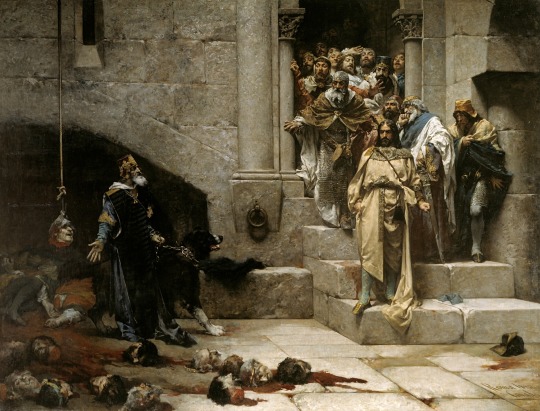
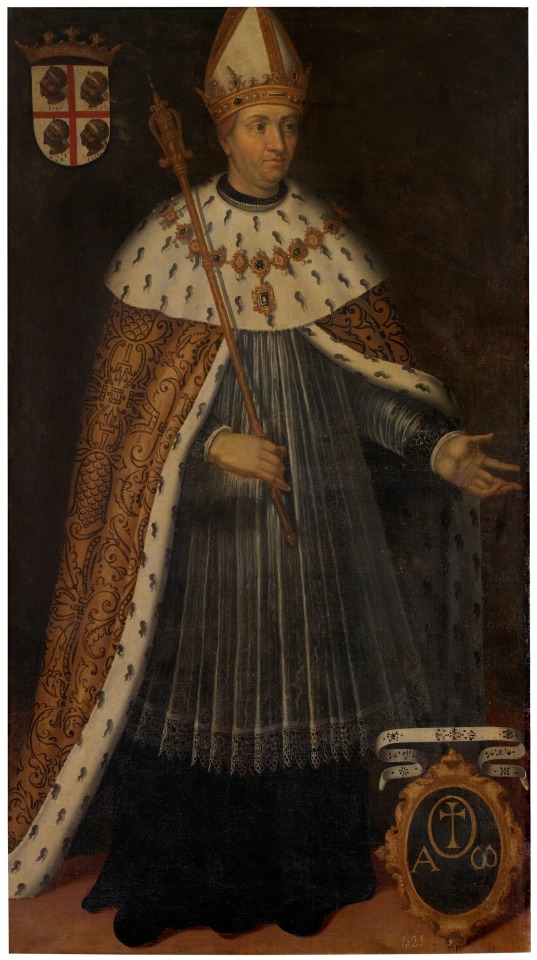
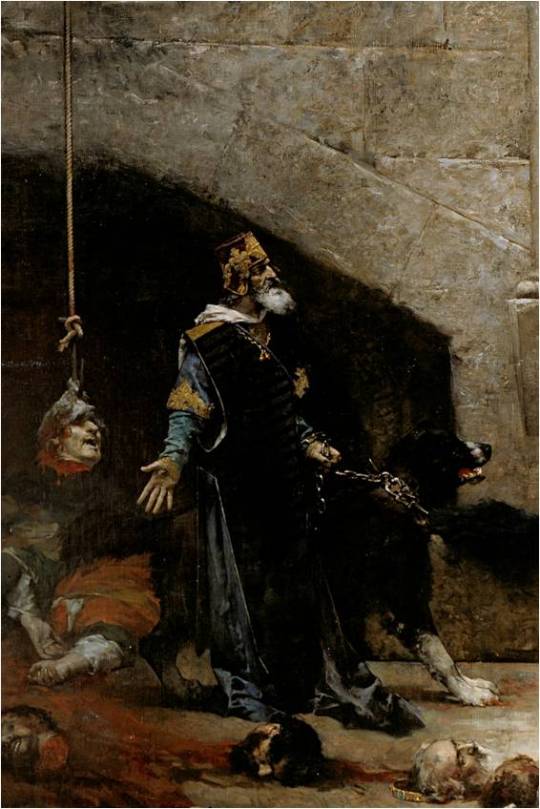
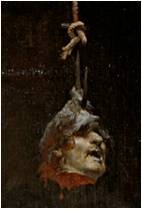

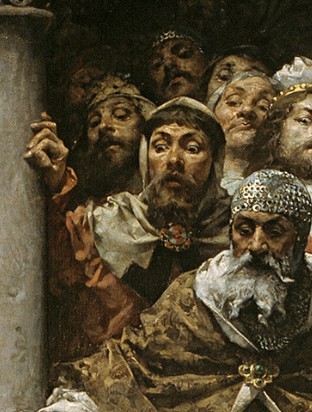
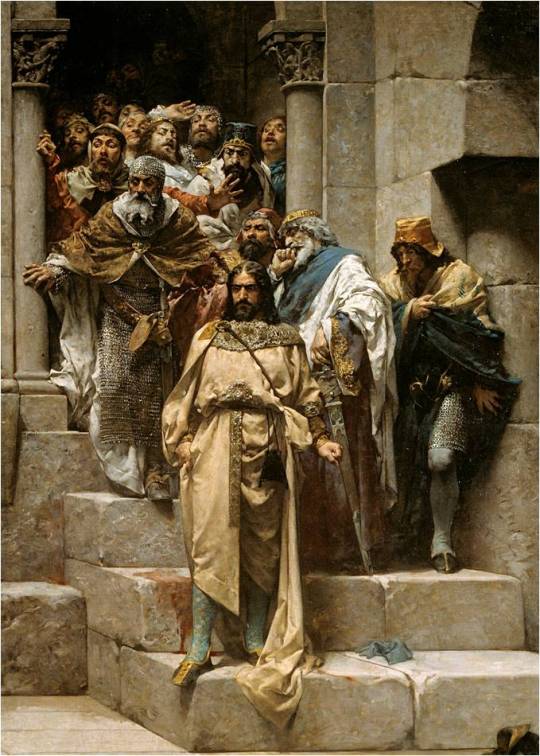

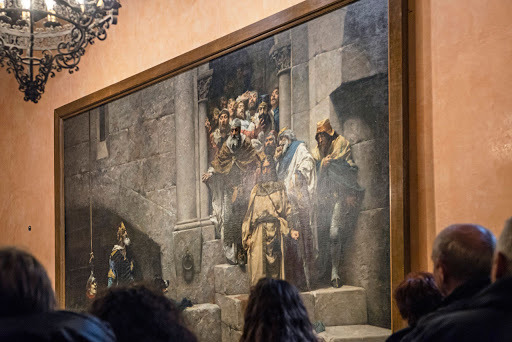
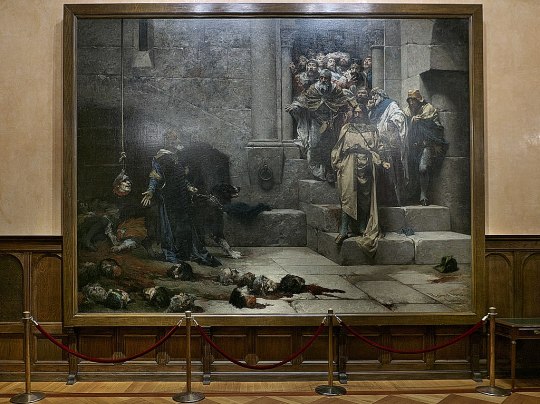
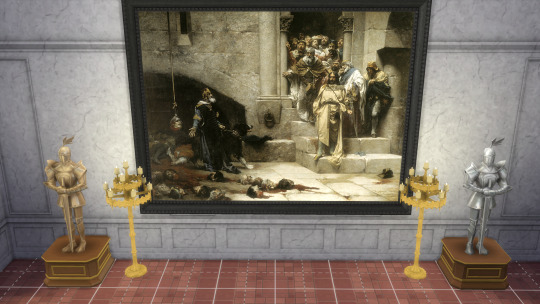
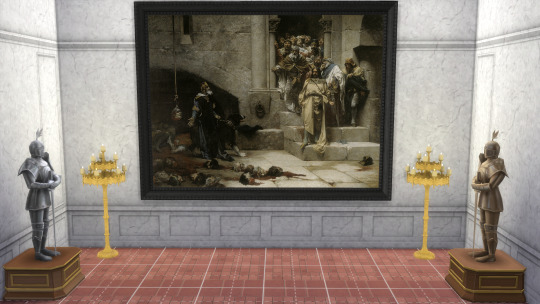
38 notes
·
View notes
Text
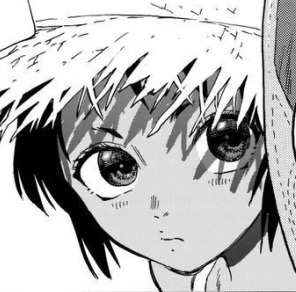
“Yes but it’s less about social status right? You want a person to respect you because it’s just pure common sense you want to be treated the same way you treat other people. I mean anyone could wear a crown but when it comes right down to it, what matters is seeing the person wearing it instead of the gold.”
"I am literally a princess. If my partner doesn't treat me with the respect I deserve, then what's the point?" Hime had her priorities.
4 notes
·
View notes
Note
tali i have kind of a weird question? growing up my family never watched a lot of classic/common movies (we were FIRMLY a veggie tales house) so I have No Clue what like half of the movies you mention are? like I've never seen footloose or what a wonderful life or die hard? or practically... anything you've ever talked about :(
(also ive never seen mean girls but thats a oersonal failure cas I just. forget to watch it?)
do you have a fav/good movie i should start with cause I feel like I'm missing out on so much :(
hi honey!! you’re so valid, and i had LOTS of veggie tales experience growing up. i know you asked for one, but i went a lil ham on this list because you’ve unknowingly touched on one of my favorite hobbies
okay so i have a big list for you, but it’s in really manageable chunks!! i went to theatre school at the school that houses the Best Cinema School in the World (fight on, usc) and i have Opinions™!!
if anyone has any other recs not on this list, drop em in the replies!!
i’ll put these in order of my preference/pop culture relevance, so it’s all subjective and idk what your taste is like, but if you have any questions im always here for you!! i’ve added a few notes and disclaimers along the way
this is a really good list to go off of, in general!
okay so here are my top seven films that i never get tired of watching, in order.
skyfall
that thing you do
captain america: the first avenger/captain america: winter soldier
inglorious basterds*
the sound of music
knives out
blazing saddles**
* inglorious basterds is a quentin tarantino movie, and tarantino isn’t for everyone. his films are always really bloody, intense, and rife with bad language. i don’t like him personally, but i love his work. this is, in my opinion, his best and funniest work
** blazing saddles is a mel brooks movie, and he’s REALLY offensive and inappropriate in his satire. it’s definitely an iconic comedy, but not to everyone’s taste. it’s one of those movies where you’re actually allowed to laugh at the really horrible jokes because it’s an equal-opportunity offense-fest lmao
so here are some other genres and films that are a good foundation!
IN GENERAL!! i don’t like remakes. if there’s an older version of the movie, watch that one. trust me.
i’ve also bolded a couple of key favorites on this list
romantic comedies
my best friend’s wedding
the ugly truth & 27 dresses (katherine hiegl movies ROCK)
sleepless in seattle & you’ve got mail (meg ryan and tom hanks own my ass)
when harry met sally
movies based on books/short stories
to kill a mockingbird
the book thief
the hunger games trilogy
divergent
chronicles of narnia
pride and prejudice (2005 or the bbc miniseries)
3:10 to yuma
based on a true story
ford v. ferrarri
three billboards outside of ebbing, missouri
moneyball
zero dark thirty
the king’s speech
black mass
apollo 11
documentaries*
ken burns’ civil war
ken burns’ baseball
paris is burning
blackfish
free solo
the hunting ground
* please be advised, some of these documentaries cover some disturbing and distressing subjects. please engage responsibly!
superhero movies
iron man
the dark knight*
wonder woman
scott pilgrim vs the world (okay give me this one)
spider man 1, the amazing spider man, and spiderman: homecoming (all different spidermans, all great movies!
deadpool**
* tdk is really really dark, but the performances are immaculate. ** deadpool is wildly inappropriate, so don’t take the R-rating lightly! it’s so funny though. so so fucking funny.
teen favorites
10 things i hate about you
mean girls
she’s the man
easy a
heathers
70′s icons
jaws
monty python and the holy grail
butch cassidy and the sundance kid
star wars trilogy
dirty harry
80′s classics
alien (technically in ‘79 but feels like an 80′s movie)
dirty dancing
john hughes movies!! the breakfast club, st. elmo’s fire, pretty in pink, sixteen candles, some kind of wonderful
back to the future
footloose
princess bride
90′s flicks
the matrix
three men and a baby
thelma and louise
pretty woman
notting hill
a league of their own
lgbt +
our own private idaho
brokeback mountain
moonlight
philadelphia
call me by your name
love, simon
some of these movies don’t get everything right. if you do choose to engage, engage critically and let the art make you feel something.
tom hanks movies
yes he gets his own category
joe v the volcano
castaway
big
saving mr banks
movies where the government saves matt damon
the martian
saving private ryan
interstellar
jason bourne (technically he saves himself, but he’s still funded by the government)
war movies
fury
band of brothers
full metal jacket
the last full measure
war horse
1917
hacksaw ridge
westerns
django unchained
the magnificent seven
true grit
the good the bad and the ugly
a fistful of dollars
old hollywood
an affair to remember
breakfast at tiffany’s, roman holiday (audrey hepburn is an icon of the era)
any alfred hitchcock movie, but psycho and rear window are my faves
these movies don’t get everything right. they are a product of their time and often come with insensitive and unironically offensive cultural baggage. if you so choose, engage critically. you’re still allowed to enjoy the movies, just understand what’s not acceptable!
christmas movies
it’s a wonderful life
white christmas
a christmas story
the holiday
die hard (some people don’t think this is a christmas movie. i disagree.)
the family stone
a year without a santa clause
halloween movies
hocus pocus
beetlejuice
anything by tim burton - the nightmare before christmas, the corpse bride
the shining
the blair witch project
get out
cult classics
the rocky horror picture show
the room
reservoir dogs
jennifer’s body
point break
these are WAY more fun with friends - please quarantine responsibly, but it's so worth the wait to watch this with a big group of people.
29 notes
·
View notes
Photo



On this day in history (June 30, 1478) the long awaited male heir of the Catholic Monarchs, John of Aragon and Castile, was born at Seville.
Now everyone was waiting to see what would happen, a full eight years after she had given birth to Isabella. ‘One single hope for the future shone brightly in the hearts of Castilians, the long-desired delivery of Queen Isabella’s child,’ wrote Palencia, who said Isabella hoped for a son. Ferdinand, conscious that he would soon be king of Aragon, also prayed hard for a son – but he worried more about his wife. ‘As the pregnancy looked as if it might run the danger of a miscarriage, the king was especially anguished, moved by his indescribable love for his wife, preferring above all outcomes that she should emerge safely from the experience.’ Others might have put the birth of a male heir first. Perhaps Ferdinand was frightened by the size of Isabella’s expanding womb and the dangers that pregnancy and childbirth brought to her. A rumour spread that he had ordered the beheading of a man who had joked that the Queen would ‘either give birth or explode’.
- Giles Tremlett, Isabella of Castile: Europe’s First Great Queen
In March, a letter from an agent of Juan of Aragón to Fernando conveyed a general atmosphere of expectation and the widespread hope that the royal child would be a boy: ‘It is good, Your Excellency, for here is the most grave and grand matter of Spain, and nothing is more necessary or desired.…’ The hope was fulfilled. On the morning of June 30,1478, Isabel gave birth to a son and heir. Present as the child was born was a midwife and, by royal order, numerous courtiers and city officials, for it was a state occasion and there was to be no question that the child was the queen’s. Court and city celebrated for three days and nights. That Isabel’s second child was male crowned the successes of those years and was widely interpreted as a sign from God of his approval, and of yet greater victories to come.
Seville resounded with fiesta. On July 9, the baptismal procession made its way from the palace to the cathedral through thronged streets, the prince nestled in brocade cloth in the arms of his well-born nurse, Maria de Guzmán, the mule she rode flanked by eight councilmen bearing staffs of office and wearing great cloaks of black velvet ‘provided by the city.’ Alvaro de Stúñiga, the late great rebel, walked directly behind. Three of the queen’s pages strode along at the head of the procession. One held a gold jar, another a gold cup; the third, carrying the customary candle, baby cap, and money offering on a tray, was “so small that he bore the tray on his head, holding on to it with both hands.” All the nobles at court accompanied child and nurse, on foot; so did many knights and other people. Silver crosses gleamed above, and trumpets, hornpipes, and sackbutts played ceaselessly.
The prince was baptized Juan in the cathedral, ‘very triumphantly.’ That observation was made within the description of those proceedings by a new chronicler of a new sort, Andrés Bernáldez, a militant Andalusian chaplain much less concerned with political relations, much less critical of anyone both orthodox and powerful than Isabel’s earlier chroniclers could on occasion be; Bernáldez exuded a crusading patriotism. Officiating at the baptism was Seville’s archbishop, Pedro González de Mendoza, chief among courtiers. The godparents were the constable, Benavente, Nicolò Franco, the papal legate, and Leonor de Mendoza, duchess of Medina Sidonia. A second procession, even grander, took place a month later, on August 9, when the queen went ‘to present the prince to the temple as was the custom of Holy Mother Church. She had waited until then as was also customary, for a woman was not to enter a church after childbirth until “being purified of her blood.’ Fernando led the way on a small silver-grey horse. He was opulently regal, wearing heavy brocade lined in gold and trimmed in gold and black velvet, and a broad hat also lined in cloth of gold. (It was sweltering midsummer in Andalusia; little wonder that Fernando reputedly said that all he wished to his enemies were winters in Burgos and summers in Seville.) At the center of that procession rode Isabel, dressed in brocade shimmering with pearls, mounted high upon a white trotter, its saddle of gold encrusted with more gold and with silver. Accompanying her on foot were most of the city’s council and many nobles. The constable, Haro, held the right-hand bridle rein of her horse; Benavente held the rein on her left. The infant prince, again swathed in brocade, also rode, carried by his nurse upon a mule with a saddle of velvet. Musicians kept pace, playing trumpets and hornpipes and many other instruments.
She centered much affection and her dynastic hopes on her son and heir, Juan. She paid great attention to his education and did not stint on his court, his activities, his clothing, and his retinues, nor on his participation in court pageantry and festivities. He was given his own household and there waited upon as befitted a great prince, with exact protocol maintained from rising to retiring. A hierarchy of servants made a ritual of dressing and undressing him; grandes attended him. She attached to his household her own mentors: Gonzalo Chácon, now known as el viejo—the old one—and whose grandson of the same name was one of Juan’s companions, and Gutierre de Cárdenas as Juan’s mayordomo mayor and contador. Juan’s tutor, Diego de Deza, who had taught theology at Salamanca, was a nephew of yet another of her longtime comptrollers, Rodrigo de Ulloa. She arranged her son’s daily routine. Each morning there were prayers with Deza, then mass, then lessons. Since Juan particularly enjoyed music, she would often send to him during his daily two-hour rest period her music master and four or five choirboys, and he would sing with them, tenor. He was given his own musicians as well and he owned and played a number of instruments, among them the first Spanish claviorgano, a combination of organ and plucked string instrument, made by one Mofévrez, a Muslim grandmaster from Zaragoza; it was a present from his half-brother, young Alfonso de Aragón, archbishop of Zaragoza, Fernando’s son. Yet Juan’s health was always delicate. Isabel had his diet and regimen carefully monitored. Each morning doctors visited and he reported to them on how he had slept, and on his digestion and bodily functions. Münzer, indicating physical disability, wrote of having saluted the prince in Latin and of Juan’s understanding it but ordering Deza to reply for him since, said Münzer, he suffered from a weakness of the lower lip and tongue that impeded his answering plainly. Isabel spoke of her son as ‘my angel’, and had him sent treats considered good for digestion: strawberry conserves, lemon blossom candies, other sugared sweets, and jars of quincemeat from what she referred to as ‘Valencia del Cid.’ Juan’s upbringing tells a good deal about Isabel. One of his pages later recalled that in his education the queen had cared as much for letters as for other abilities and, above all, for virtue. Manly virtue included proficiency in arms. Juan was given a master of arms, and the prince slept with a sword at the head of his bed and was instructed in its use. His father had knighted him before Granada. His mother had even earlier provided as companions for him ten knights, five mature, five young, ‘a species of colegio.’ One, who had fought at Granada, dedicated to the boy a translation into Castilian of Caesar’s commentaries, avowedly to convey that arms would not benefit him without good counsel. Juan corresponded with the humanist Marineo Sículo and with the poet Juan del Encina, who adjudged him as learned in sciencia as in empire. Juan was, that is, raised in the atmosphere then permeating the royal court and compounded of a fervent and militant piety, a resurgent chivalry, and a rising vogue for humanistic classicism. Isabel gave much thought to Juan’s education, designing what she conceived to be the ideal upbringing for a Christian prince. She followed principles akin to those of the Siete Partidas and the mirrors of princes as though glossed by current usages and humanist studies, but their essential base and hers was orthodox religion. That unusual attention to his education and her ideas about what constituted it were reflected in a treatise written by a courtier close to her, Alonso Ortiz. Ortiz composed the work as a dialogue between the queen and Cardinal Mendoza. Surely echoing her own concerns, the principal question the treatise raised was how to achieve the spiritual health of the prince; the answer it gave was through learning good habits in childhood. In that treatise, Mendoza presents a highly traditional Christian rationale with some humanistic overlay. Thus he cites a Christian Platonist and somewhat Pythagorean understanding of purification in stating that the stars incline us and the wiles of the demons push us toward vices, that original sin infected everyone, corrupting the flesh and weighing on the soul; that the flesh submitted to the influence of the stars but the will remained free, subject only to God, yet needed instruction in order to gain wisdom. Training in will power, he explained, would develop natural abilities and correct bad inclinations; it could purify. Accordingly, he advised an education consonant with the stages advocated by Plato and Aristotle, an education leading to virtue both moral and intellectual, and so to the happy mean. Virtue and vice he declared within human power, life a pilgrimage toward blessedness and bliss, toward the eternal life of which Saint John speaks. That dialogue was itself a guide for a prince’s education, as it simply assumed much of what such guides had heretofore customarily stated, that the monarch’s spiritual health was the same as the common good. Taking for granted the importance of the prince, it concentrated on this specific prince’s personal development in wisdom, justice, moral qualities, and high character. In passing it revealed a good deal about humanistic education as understood at the Spanish court in the 1490s.
- Peggy K. Liss, Isabel the Queen: Life and Times
#perioddramaedit#historyedit#on this day in history#isabella i of castile#women in history#john of aragon#men in history#isabel tve#S02E06#michelle jenner
105 notes
·
View notes
Text
Sapphire snickered at Ryuji’s bemoaning. He then rolled his eyes, but much less at his partner and more towards himself having felt gooey, gushy, and downright nauseating feelings before.
{Where have I heard that from? Heh...heh...}
He then moves a finger in a circle to create a little heart out of his aura magic.
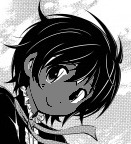
“Tell me about it. I mean as if it isn’t bad enough wondering to yourself if they’ll return your feelings but then you feel all confused inside when they’re around! It’s like being in a horror movie...only not really when it’s an overwhelming amount of love crushing your soul and not some demonic entity.”
He pops the heart on Ryuji’s nose.
“But if I had to guess? All of those sickening butterflies in your stomach probably mean that you love them so much that mere words or actions aren’t enough to express how you feel. So, you start feeling a little lost and scared because you care so much and want to shower them with all the affection you feel they deserve.”
He places his hands on his hips.
“Or something meaningful to that effect. It’s about as deep as the trivia you find on the back of a cereal box.”

"...Seriously, crushes suck - why do I gotta get all sweaty and weird around the person that I like? Shouldn't I feel good around someone I like...?"
19 notes
·
View notes
Note
(viviskull) as long as we're together, does it matter where we go? *Vivi*

"Tengo tanta hambre que me comeria un caballo."
Sapphire was aware that Vivi was well-versed in her mother language. But did she know Spanish? He basically said that he'd consume a whole horse if he could. He didn't want to ruin the sentimental moment and tell her that whenever they went right now? He'd hoped there was a buffet somewhere! He puts his hands against his stomach and leans against his sister, nodding in agreement.
"Ah, yes! Together as best buds! No matter what comes our way! Not even--!"
Growl.

"Monsters."
1 note
·
View note
Text
Visual Guide to Adventurer George “The Comet” Crawley’s search for the “The Vanishing Princess” (1928 - 1936)
youtube
Luthien Tinuviel: (Elven Princess/Original Incantation)

“While exploring the throne room of the kings and queens, I found this.” The boy suddenly put up next to the masterful illustration of Lady Elfstone a large photograph of a mural upon a pearl marble wall.
Martha Levinson took a step closer as if drawn in by what she saw. It was a painting of a woman dancing by moonlight through a forest. Fireflies fluttered about her painted figure as she moved. The young woman had long raven tresses that were sown with flowers of the forest. Her figure was pale and slender with bright shining grey eyes. The loose gown she wore was cerulean and made of a fine silk that sparkled in the moonlight. For a moment, Martha was once more overtaken with the same overwhelming sense of sorrowful love for the woman in the wall mural as Lady Elfstone. She caught herself reaching out to touch the photograph. When she noticed it, the old woman cleared her throat and withdrew her hand, refusing to glance to the kid for his reaction. The young adventurer looked up at her, but yet, there was no judgement in his eyes to her emotion.
Lady Elfstone: (Last Princess of Byzantium/ First Lady of the House of Grantham/ Second Incarnation)

“Who is she?” She desperately stifled the emotion in her throat.
“This is the Lady Elfstone …” The boy read from the ancient inscription in the chronicle. “To what her real name is, I don’t know, they don’t say. She was a Byzantine Princess, the last of the Imperial House. She had fled the fall of Constantinople. How she got to England, no one knows, not even the monks of the abbey. She washed up in Wales and was found by a Tudor Lord. They said that she had never spoke of her life in Byzantium again, “fore the grief of her people’s ancestral city afire was too great”. But she was a beauty like holy sapphi … uh, well, to sum up, they say she was really beautiful. And uh, her voice was a match for even a heavenly chorus. She was kept as a prize of the Lancastrian Court in London. The monks here say that only her presence and the Grecian hymnals and songs she wove could quell the fits of madness that would overcome Henry VI, and so Margaret of Anjou kept her a prisoner in the tower.” The boy turned the page. He blew on the dry piece of parchment as he leaned close to read. “It seemed that Queen Margaret wanted to give her to the Lancastrian Heir. But on the day of their wedding, she uh, she fled, I guess. Someone smuggled her out of the castle … and she rode for Yorkist lands in Northern England. She sought sanctuary at … Downton Abbey.” The boy stopped and looked up in surprise at Martha. For a just a beat they felt a pang of something, a tiny breath upon their neck, a slender figure crowned in roses that sat upon the sofa watching them. The boy shook his head and continued.
“The monks took her in, but uh, Lords Somerset and Percy marched an army to take her back …”
“Must have been one hell of a woman.”
“Yeah, well they incurred the wrath of the Knight of the county … Sir Grantham “The Black Dragon”. He was the bastard son of Lady Katherine Percy, and Lord Percy’s half-brother, whose land the abbey was on. There was a battle on that field over there.” The boy pointed past the columned veranda at the edge of the gardens. “They outnumbered Sir Grantham’s forces three to one, but the Knight wouldn’t yield to them the beautiful Lady for any price, threat, or odds … eventually, the “Black Dragon” stood alone and surrounded, fighting his last stand by the doors of the abbey itself taking up a notched battle axe and stricken helm, but uh, he fought off waves of enemies, still unwilling to surrender the Princess even then. Oh, well, lucky for him, Edward of York arrived with his father’s men and drove the Lancastrians off Grantham’s land. But still, he was wounded, having cut down many of the greatest of the Lancastrian Knights in defense of the Lady. It says here that the monks and the Princess healed him, and there …” The boy was quiet a moment. “Sir Grantham fell in love with the nameless princess who sat up with him through the worst of it. He gave to her the name … Lady Elfstone for how she shimmered in the sunlight by the abbey’s windows.” There was a touch of a sad smile of reverence on his face as he turned the page with a crackling of ancient binding.
But then the boy didn’t say anything else.
“If I wanted damn cliff hanger I’d go to a serial, Cowboy.” Martha scoffed in annoyance. “What happened next?” She pressed.
The kid flipped through several pages, then flipped back. “I dunno …” The boy said in genuine confusion. “This is where the entry stops.”
Ilona Tepes: (Princess of Wallachia/ Third Incarnation)
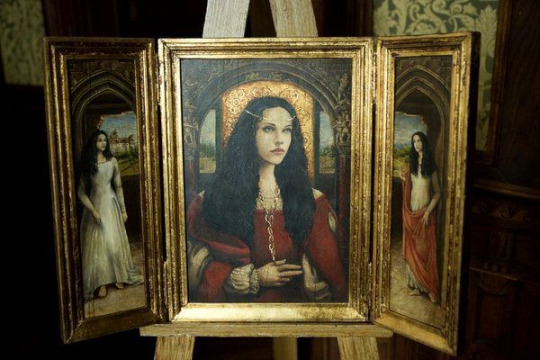
“Yeah, well if you’re freaking out about that …” the boy retrieved his leather folder. “Then this will put some hair on your … uh …” He looked Martha up and down for a moment. “Well, it’ll put hair on whatever it is you have, uh, down there.” He cleared his throat with quirk of his eyebrows awkwardly. He took the spot next to the old woman, ignoring her two clenched fists placed on her hips with a deeply grudging glare directed at him.
“Alright …” The boy cleared the air. “So, about a century after the first Lord and Lady Grantham’s deaths there was a Prince of Wallachia in Transylvania named Vlad that they called Dracul, which translates into “The Dragon”.” The boy explained. “He married an English noble woman named Ilona, I don’t know where she came from, and there isn’t a lot known about her … most of her records were scrubbed by someone long ago. But there is one thing that survived the Catholic Churches purging of the House of Tepes. A Triptych of Ilona was painted by an artist named Dresden and was send as sort of a wedding present to her husband. I don’t know where the original is, no one does, they think it got destroyed along with Alexander Grayson …”
“Oh yeah, I remember that moron. Industrialist. The dumb bastard blew up half of London with his newfangled electro power machine thingamajig. Cora and Robert were supposed to go to that unveiling, but Mary was kicking inside her, and they stayed home … about the last useful thing that girl ever did, and she wasn’t even born yet.”
“You’ll hear no disagreement from me.” The kid replied with an easy bitterness. “Either way, whether Grayson died with it or not, there is a record of it being sold to a Lord Davenport who was the uncle of Lord Anthony Strallen.” He shrugged.
“Wait? The chud who left Edith at the alter …?” She blew out a bitter scoff. “Is there anyone who owned this thing that wasn’t a prick?” She asked rhetorically. “I swear, having this triptych or whatever is more judgement on the owner at this point.” She waved off.
The adventurer glared in a long pause. “Anyway …” He pushed past her rant. “There is an insurance claim on the painting from the auction house that it was bought from.” The boy put another photograph next to the drawing of lady Elfstone over the page of the inscription.
“You can’t be serious.” Martha shook her head scratching her ear.
The photograph showed a renaissance painting that was separated in three folding parts. On the left section was a slender maiden standing in an arch by a window which had the Castle Dracul in the distance upon a field of green. She had long tresses of raven hair and cerulean eyes. Upon her lithe and milky frame was a simple dress of pure white, one slender hand clutching the skirt. To the right was the same woman standing in the same arch but by a different window which was now viewing countryside farm fields of wheat upon sloping ground. This time she clutched a red cloth over her white gown. Both depictions of the same woman from right to left faced one another, each one seemingly staring at the main painting in the center. Once more it was the same woman. But this time she was centered in front of a wall that was flanked by a piece of each adjacent window from left and right of the folding painting. She was regal with a head crowned by a golden band and a matching braided chain necklace. Garbed in a gown of red with thick white sleeves underneath, Ilona Tepes seemed a saint in the three painted depictions.
She also was the exact replica of both women that sat to her left on the puzzle desk.
“Her too?” Martha exclaimed. “Jesus Christ, Kid, how many of these broads are there?” She asked. But when she turned to the boy, he only blew out a breath with a look that was telling.
“You’re kidding me?!”
Mina Murray: (First Female Medical Student, University of London/ Fourth Incarnation)
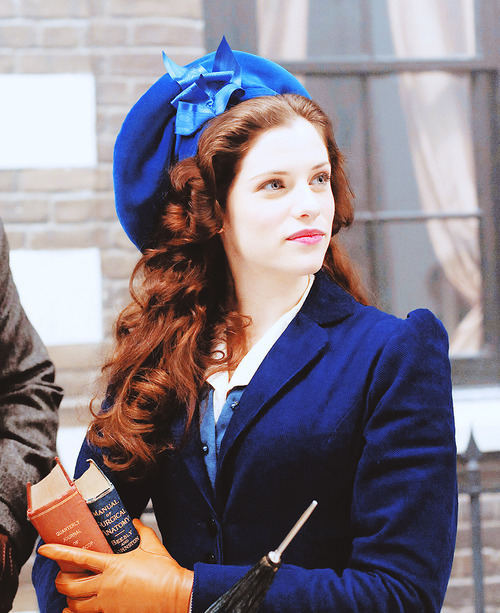
“So, we flash forward nearly four-hundred years later to London in the 1890s …”
“Skip ahead “professor”, I know the steps to this one, I was there ...”
“Sore subject?”
“Sore nostrils, everything smelt like piss, including Buckingham Palace. And there was shit everywhere … horse and human.”
“Then you should’ve felt right at home with amount you shovel.”
“Yeah, well, open wide, Cowboy, so you can eat some. It’s on the house.”
“With your monopoly, I bet it is …”
“…”
“…”
Both glaring at one another, the boy slapped the scrap book packet next to the photograph of the Triptych. On the front page of the paper was a black and white picture of a young woman with a bonnet of blue with matching ribbon, leather gloves, and long overcoat that covered a white blouse. In her arms was a collection of books against her breast, with a blue umbrella hooked on her wrist. Once more, though less surprising now, the beauty in the picture matched that of the previous women on the puzzle desk. Raven hair, milky skin, slim, with demure and innocent eyes that sparkled. But what was different was that a sudden light of recognition hit Martha Levinson as she studied the paper, flipping through articles.
“This is …” The adventurer began
“Wilhelmina Murray.” The old woman finished for him. “Yeah, I remember her.” She nodded. “We met ten or twelve times when Cora was doing her first and second Season in London. She was the daughter of old Dr. William Murray. He ran Royal Bethlehem. I believe my husband and I made quite a sizeable contribution to expanding their Psych Ward. In fact, I believe they named the new wing after me.”
“They named the Psych Ward in Royal Bethlehem after you?”
“Yeah …”
“…”
“…”
“Shut up!”
“I didn’t say anything.”
“No, but you were thinking it.”
“Entry for the defense?”
“I’ll allowed it.”
“I’ve been thinking that since we met.”
“Fair enough. You know, us Southerners like our women religious … and just a bit mad.”
“Your preachers gotta learn it from somewhere, I guess.”
With a momentary understanding reached, Martha flipped through the packet. “Yeah, beautiful girl … she had brains too. She was the first female medical student at the University of London.” She nodded. “I remember, she was always trailed by some young thing that lived in her front pocket. What was her name? Uh, hmm … Oh, right, Lucy! Lady Lucy Westenra, that’s it. She was a sleek blonde piece of bitch that one. Seemed odd that the shark of a woman hung around with such a gorgeous little lamb.” Martha shook her head.
“You seem to remember her rather well.” The kid observed.
The old woman glared. “Like I said, I was there.” She put the papers down. “Anyway, she was hard to forget. After Robert and Cora got engaged, they started to do fluff pieces in the New York papers and one of them involved Ms. Mina Murray.” She shrugged.
“What was it?” The tone in the boy’s voice was suddenly serious.
When the woman looked over, she saw that the mentioning of Cora and Mina in relation captured his attention. It seemed in that instance that there was something about this mystery that was personal to the boy. That underneath all the intrigue and research there was a very serious reason that he was chasing this “Princess in the Mirror”. Something cold ran up Martha’s spine in a maternal six sense. Slowly, she was beginning to realize that whatever this was, it had everything to do with her family, her little girls, all of them.
When Martha answered it was with a new caution. “They were mistaken for one another sometimes. They went to similar parties during the Season and reporters approached Mina, thinking her Cora. “The New Yorker” did a fun article about Cora’s popularity in London and the mistaken identity craze between Cora and Mina. They even photographed them together … Listen, Cowboy, I shovel shit for a living, so I know what it smells like. Are you gonna tell me what’s going on here?” She asked.
“She’s dead …” He blurted out as if it was the answer to her question.
The old woman frowned. “What?” She didn’t know why, but a deep pang of hurt filled her when she heard him. The boy, morosely, turned and retrieved something from his pack.
“How do you know?” She asked in a grimace.
“Because …” The boy held in reverence a long crimson scarf in his hands that looked tattered and damaged.
“I was there.”
Lady Sybil “Sybbie” Afton Branson: (Contested Viscountess of Downton Abbey/Heiress to Branson and Talbot Motors/ The Final Incarntion)


But then, in that very moment … she saw it.
“Sybbie … can you come here, baby?”
The girl frowned in puzzlement gliding toward the old woman’s hands. It was the dress of sapphire and silver, the white roses abloom she wore in her glossy raven tresses, and the morning tide of a beauty unrivaled but for golden and graceful Marigold only. She gently took the girl’s delicate face in her hands and looked into her near glowing cerulean eyes that were inquisitive. Then, it was clear as day who she was looking at.
It began in an enchanted forest with an angelic maiden of pre-history. Then, thousands of years later, came a lost, broken hearted, and desperate Princess of Byzantium, the last of that ancient race. There was Ilona Tepes, finer than all of the gold and silver in Wallachia, burned at the stake for her husband’s sins. Afterward came Mina Murray, kind, smart, and a tragic pawn in many a game of worldly consequence who died in the darkness of an evil temple many leagues under the fathom’s abyss. And now, raised gently and with boundless love in the fairy halls of Downton Abbey, there was Ms. Sybil Afton Branson.
Even as her thumb rubbed the little girl’s cheekbone cherishingly, the old woman looked up to the kid who stood off to the side clasping his fob watch in hand. Then, she saw the recognition in his blue eyes of her finally seeing what he had known all along. There were so many things unspoken in one acknowledging glance that drew both back to the pictures. Then, it was clear why the boy had done all of this, why he was so terribly invested in finding the answers to this repeating curse of doom or fate.
It was a great labor, a secret mission, and a case of lonesome obsession. Whatever tormented him, the chief of these emotions which drove him on was love and fear. He knew of the fate of all these women who had shared a greater destiny and doom. And it was by great love that he feared for Sybbie’s very future. He knew that whatever waited for her, there was greatness mingled with a matching sorrow whose ending was that of despair and ruin. What strength was in the boy, however little he knew of in himself, despite what others saw in great store, he would not allow these terrible things to happen to her. With all his power, he vowed to protect one whom he cherished above all things left to him in this world.
He would not fail to save a girl he loved, not this time … never again.
Conclusion - Of the fall of the House of Grantham and it’s exiled Heirs
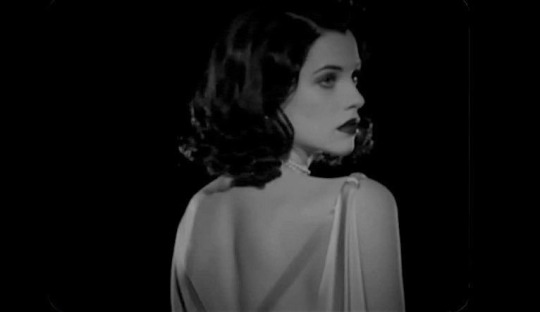
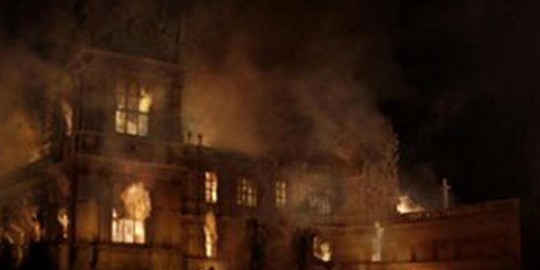

Many lives of the ancient past and future yet lived flashed like a runaway train that rolled without break through the infinite whose tracks were lain through her mind, heart, and soul. Tears ran down the pale cheeks of this indefinitely young creature of surpassing loveliness. In her induced state, she was all of them at once. In her consciousness was each woman of regeneration since the days before days. But also, the final incarnation, whose betrayal in the arms of a Nazi husband from the beautiful grounds of their South American estate would lead to the fall of the House of Grantham and the beginning of “The Long Defeat” of its exiled heirs.
Yet, the adventurer’s mind was not on the plight of his future children. Nor did he comprehend their and his own betrayal by one whom he loves and would search vainly for in a terrible torment of many long years of despair after her capture during the war and disappearance afterward. And further still did he not know of the terrible evil that would be found this day, and ever afterward curse him and his line of descendants with its hatred and malice. Yet, if he did have the foresight and providence for such a moment … the youth would still not budge, nor give an inch. Even if all the suffering of his children, grandchildren, and great-grandchildren swirled about him in a roar of sorrow and despair like a rolling river rapid, he still would not yield the maiden fair at any cost to himself or his kin.
This was clearly seen, but not yet respected by Professor James Moriarty.
(Taken from the Downton Abbey Fanfic “Medel an Gwyns”)
9 notes
·
View notes
Text
Katie McCall Chronicles - Dragged Back Into Hell - Chapter 2 UPDATED
A Dresden Files inspired story.
The story is set between Proven Guilty and White Knight.
Sergeant Karrin Murphy was a police officer with Chicago PD, as part of their SI division. SI investigated anything that couldn't be explained and stopped it, then explained it in a normal mortal way. Rumor had it she's the one that killed the giant werewolf thing several Halloweens ago. Karrin was half a foot shorter than me and was sporting short blond hair. She was very pretty and looked bad-ass in that "she could kick my ass easily" sort of way. She asked me several questions about the incident. It was mostly routine. How many were there, what could I remember about them, and of course, what did they want? I answered as best as I could with Harry standing ten feet away from me and Karrin. She kept glancing at him then back to me. Finally she asked, "Is he afraid of you or are you afraid of him?" "I'm afraid of magic." I said shortly. "I can feel the presence of magical beings, energies, and things, and his energy is frightening, not to mention his reputation." She nodded at me knowingly. "Makes sense, plenty of things out there to worry about. Harry suggested you stay with me for a while. Do I have to worry about my computers and tv exploding?" I nodded awkwardly. "Sorry for the trouble." Karrin laughed and gently patted my shoulder. "It's okay. You don't have to apologize for having that power. You can't help what's inside of you. Luckily I have some vacation saved up so we can just spend it at my place." She paused a moment. "Do you mind if Harry comes with us so he can set up some wards around the house and keep an eye on you while I turn off all the electric stuff at home?" I shook my head in reply. "Good. Did your power detect what the vampires were?" I gave her a nod quietly. She smiled warmly at me. "Don't worry, we'll get this all sorted out. You trust me right?" I gave her another nod. "Excellent. Gather your things, I need to talk to Harry real quick and then we'll head out together, alright?" I gave her a weak smile and watched her walk off. I went over to the desk where we wrote down the books being checked out, yay out of date, underfunded library, and gathered my things and a couple of books I was allowed to set aside and read myself. I turned around and saw Karrin walk over. She looked confused. "Is something wrong, Sergeant Murphy?" She smiled, it was beautiful, "Please, call me Karrin." Her frown returned, "You said the vampire woman Harry cooked kissed you on the mouth right?" "Yeah. Oh." I closed my eyes as I realized what her confusion was about. I opened my eyes again, focusing on her eyebrows, "Right, the saliva thing. The Warden that saved me six years ago checks in on me from time to time to see if I'm willing to sign up and join the wizard army. Last time I asked if he could make some anti-saliva potions so I could make sure I was immune or at least resistant to the effect. I've got like three more at the apartment." "No kidding!" She turned around and shouted, "Harry, she has anti-vamp juice." She turned back to me, "Now, what do you mean the Warden who saved you?" I saw Harry blink his eyes in surprise at Karrin's comment. I guess Harry wasn't expecting me to have that. "A thing happened a long time ago that I'd rather not talk about, but it was," I paused and winced, remembering, "painful. A Warden saved me from that." ---------- We shuffled into the car. Harry was in the backseat and I was in the front with Karrin as she drove. I tried to think calm thoughts during the drive, adjusting my clothes to make sure nothing was left out of place after the attack. Mostly, I tried not thinking about the fact that Harry was a wizard and Warden of the White Council. I tried not to think about the fact that it was August and the broken door was going to take forever to fix. I also tried to avoid thinking about the fact that I felt Karrin Murphy was a beautiful older woman and sitting next to me. Okay I thought about that last part a lot. I haven't had a relationship in years and any chance of a booty call was snuffed out when my date's phone, lights, and tv kept fizzing out. I had tried the motel thing a couple of times but it still never worked out. Broken cellphones seemed to bother people more and more each year. Tension was thick through part of the ride before Karrin let out a sigh and asked, "So Katie, is that short for anything?" I gave a nervous glance to Harry and then nodded. "Yeah but due to the fact that many can do things with a person's name from their own mouth, Katie will have to do." I could practically feel the wince at my lack of trust in Harry, but if you were reported as able to throw a car onto someone and having weird conversations with invisible people, everyone would have issues with trusting you too. I'm sure he understood my concern. "Karrin," Harry started, "I'm not sure Katie is gonna have clothes to change into and we don't know how long this is gonna be. We should stop by her place. It's nearby, right Katie?" "Mmhm." I gave Karrin the directions and we pulled into the parking lot outside of my apartment complex. As we got out of the vehicle, Harry said, "I'll keep an eye on things out here, if you run into any problems, scream like-" Karrin interrupted, "Like a girl?" I couldn't tell if she was giving him a verbal jab, or was bitter at his concern. Harry gave a rich laugh, "Like your life depends on it, Murph. Because it might. We have no idea what they might have done." We nodded to him carefully. I pointed him at my windows. "Third floor, fourth from the right along with the two to the right of it." I looked at his nose again, "In case something happens. It's room three-o-four." He nodded. Karrin was kind enough to go upstairs with me. Harry was watching the car. Once we were up to my apartment, I pulled out my keys and checked the door. It was unlocked. "I didn't do that." Karrin went into the room first and I followed. My lumpy couch, small dining room table which was mostly a card table, my coffee table and bookshelves all looked right. Nothing seemed out of place. I went into my bedroom and reached under my bed to grab my overnight bag, prepacked with various bits of clothing and supplies. I stuffed a few items into it so I could have little pieces of home with me including a couple of unopened letters from my sister, Penny. I accidentally knocked over a photo of mom on my dresser. I didn't remember that being there, picked it up cautiously, and stared at it. I must have been staring at it a while because Karrin shook my shoulder gently. "Earth to Katie? You alright?" I blinked a bit and set the photo back where it fell down from. "Yeah sorry I was just-" I held my head as I swayed, my mind fogging. The room was suddenly spinning then everything went black. ---------- I woke up in the car a bit later. My head hurt but it wasn't the throbbing pain I was expecting. "What hit-" Harry spoke up first. "A magical booby trap, nasty sleep spell. I was able to get it off of you before it did any real harm." "You hit your head on the floor." Karrin asked, "Is your head okay, Katie? Who was in the photo?" "I'm alright, thanks. Mom was in the picture. She didn't see eye to eye with me having magic and-then that ass showed up." Barbara the bitch of a mom McCall was the woman who raised and gave birth to me. She was not a kind mother, constantly try to groom me as a professional singer so she could live through me. The training she put me through was grueling. Then I was revealed as a lesbian with that soul gaze, and when I finished processing I did tell mom, and she nearly disowned me. She calmed down, eventually, and insisted I never spoke about what I saw to anyone, and not to tell anyone I'm a lesbian, and that I'd grow out of it. So, that was sweet of her, if sweet meant cruel and mean. I eventually had enough and ran away from home. That's how I met the sorcerer. "The thing that you don't wanna talk about?" Karrin asked slowly. "I'm sure if you talk it'll-" "Drop it, Murph. Trust me, it's not something you want to hear. Just know it's taken care of, and she's still dealing with the after effects." "She told me that much, Harry," Karrin growled but dropped it anyway. I exchanged a glance with Harry and smiled, mouthing thank you to him. Maybe he wasn't such a bad person after all. Harry nodded to me. "Hey Murphy, can you take care of Mouse for the week?" "Mouse?" I asked quietly. I wasn't entirely sure who or what Mouse could be. Maybe a cat, a hamster, or- "Mouse is Harry's pet mammoth." Karrin laughed a bit as she spoke. Okay not what I expected. "Big, hairy, and can shove you to the ground easily." "He's my dog, he just a bit big for his age. He's also good at detecting magical threats and dealing with the more disagreeable ones." Harry gave me a small grin. "And he's quite the charmer. I haven't met a woman yet who doesn't like him, except for the ones that try to kill me." I was quiet for a moment. "But he's basically still a dog? Not some sort of weird thing that's disguised as a dog?" "Yeah. Just one great big dog. He loves long walks, hotdogs, and making sure everyone nearby is one hundred percent safe. Got hit by a van not too long ago but he's recovering just fine." Holy crap, a dog survived getting hit by a van and is already recovering 'just fine'? That was both scary and oddly comforting that he was as against magical evils as I was. Tension was back with a vengeance as Karrin and Harry waited to see if I would be okay with it. Karrin smiled when I nodded. "Sure Harry. Bring him by tomorrow." "Thanks, Murph." I had the feeling they were in love with each other.
#writing#fanfic#fanficiton#TheDresdenFiles#magic#reupload#reviews welcome#The Dresden Files#Modern Setting#Fantasy#Harry Dresden
1 note
·
View note
Text
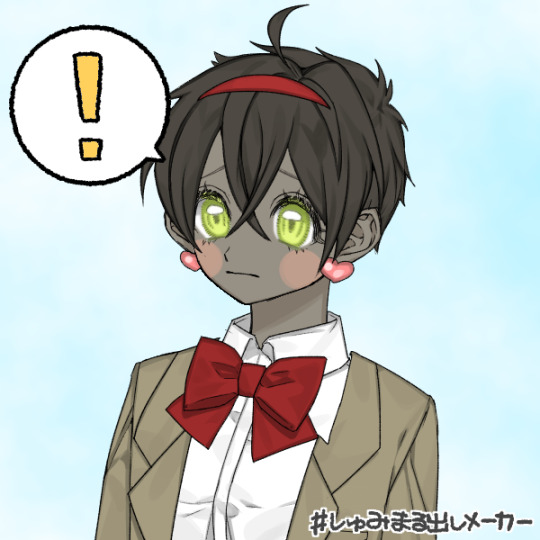
He is just going to backtrack that prior statement about their father and wave his hands around.
“Hold on. I hope this isn’t about my mixed feelings on him. I—I can explain if it upsets you!”

“Haters will see you on your coronation day and be like he doesn’t even have a father”
2 notes
·
View notes
Photo
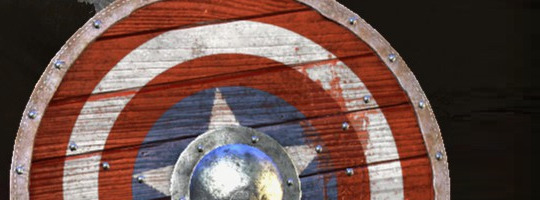
The Stone Knight
Part 1/? - Two Statues Part 2/? - A Curious Interview Part 3/? - John Doe Part 4/? - Escape Attempt Part 5/? - Making the News Part 6/? - Fallout Part 7/? - More Impossible Part 8/? - The Shield Thieves Part 9/? - Reality Sinks In Part 10/? - Preparing a Quest Part 11/? - The Marvelous History of Sir Stephen Part 12/? - Uninvited Guests Part 13/? - So That’s What It Does Part 14/? - The What and the Where Part 15/? - Gearing Up Part 16/? - Just Passing Through Part 17/? - Dinner with Druids Part 18/? - Kracness Henge Part 19/? - A Task Interrupted Part 20/? - The Red Death Part 21/? - Aphelion Part 22/? - The Stone Giants Part 23/? - Nat the Giant Killer Part 24/? - An Interrogation Part 25/? - Guilt Part 26/? - Rushman’s Brilliant Idea Part 27/? - Hunter in Hiding
Our heroes drop in on their friendly neighbourhood cryptozoologist, who shares an embarrassing secret. Oh, and I tell you where the Grail is, because that was mean.
As they headed south again, under heavy gray skies that threatened rain but never actually delivered on it, Natasha found herself thinking about several different things. The first, of course, was the urgency of finding O’Herlihy. It was reassuring that Sharon had another theory, but the only way to know for sure was to go there, and Nat had an awful mental picture of breaking into the man’s room in the Glenmoriston Arms and finding nothing but another smear of blood. Even if the Red Death hadn’t gotten there ahead of them, he was probably still on his way, and he had an entire secret society behind him while they were just five random people.
She also thought about Allen Rushman. He was going to have to stay with them for the time being, and that was okay as long as they were just visiting libraries, doing Google searches, and driving across the country. What would happen, though, if things came to a fight again? Nat had little doubt they would, and when it happened, Allen would be worse than useless. Somehow, he was going to have to be kept safe. Like any other predator, the Red Death would go after the weakest member of the herd.
Mostly, however, she thought about her theory. It was only a theory at this point – it had popped into her head at the same moment as the shock that seemed to signify the activation of a Grail fragment, but beyond that there wasn’t a lot to support it. It was based on an awful lot of assumptions, none of which she had any evidence for. She hoped she wasn’t just making it up.
Her theory was that since William the Conqueror must have known about the Grail, he would almost certainly have gone looking for it himself. Maybe that was even part of the reason he’d had the Domesday Book put together. An inventory of the entire country would be a great way to get started. If he’d found it, like Sir Galahad he would have learned that it wasn’t nearly as nice an object as the King Arthur stories would have had him believe. He’d therefore taken steps to prevent another man like the Red Death trying to get a hold of it, by wiping out any evidence that it had ever existed.
In the fantasy world this had all happened in, that would be the reason the Grail and the Red Death weren’t mentioned by the chroniclers or recorded in the artworks – the Conqueror hadn’t allowed it. Maybe that was even the reason in the real world. Who the hell would be able to tell after a thousand years? All historians had was the word of their predecessors, and chroniclers were notorious for ‘improving’ their stories or leaving out the parts that didn’t contribute to the axe they wanted to grind. The Goo-Goo Dolls had a song about that, didn’t they? All we are is what we’re told, and most of that’s been lies.
When he’d found the Grail, whether it was on Flotta or somewhere else, William would have moved it. He would want it someplace where he could keep an eye on it, but nobody else could get at it or stumble across it by accident – so he’d built something to protect it. Something that, in his world, could never be dug up or knocked down. Something he would have an excuse for setting his best soldiers to guard, without having to tell them what they were really guarding. A stronghold so secure his descendants would use it as mint, palace, prison, and treasure house, because it was impossible to break in or out.
The Grail was under the Tower of London.
At least, that was the theory. It made internal sense, but Nat wasn’t sure how well it meshed with the outside world, or exactly what aspects of it counted as truth or fantasy. Was it her lie about knowing the answer that had come true, thus placing information in her brain about something that was already true? Or was the theory a lie she had told herself, which had then come true when she believed it would come true? Would somebody searching there a month ago have found anything unusual, or had this whole thing sprung to life as part of Pierce’s thing with the statues? As with the problem of O’Herlihy, there was only one way to know, and that was to go there and see.
Part of Natasha hoped they arrived and found nothing at all. Then they’d know that the Holy Grail didn’t exist and never had, and while that would mean this had all been a colossal waste of time, at least the world would still operate by rules Natasha understood.
They arrived back in Inverness to find it crammed to overflowing with tourists. Word of the Monster had gotten around quickly, and scientists, media, and interested laypeople from all over the world had converged on the city to see for themselves. There was not a hotel room, parking spot, or restaurant table to be had in the entire town, and the Ness Bridge was lined on both sides with people holding binoculars, just waiting for one of the creatures to rear its head.
Things were fortunately quieter in the suburbs where the police station was. The storage room where Zola had broken in and Lipcomb had been killed was still roped off with yellow tape, but the police were beginning to get back into their routine. Sharon headed inside, and asked for the chief.
Chief Fraser was an overweight man with a bushy red and gray mustache, the one who’d shouted at everybody to get back to work when he found them standing around staring at the mess Zola had made of their locker room. He arrived panting for breath, having evidently run from wherever he’d been.
“Carter!” he exclaimed. “I was just wondering what happened to you! Where have you been?”
“Flotta,” Sharon replied. “I was…”
“Flotta? What, with the giants on fire and the Ebola?” The man went white and took a step back from her. “I thought you were working on the Pierce case!”
“I am working on the Pierce case,” said Sharon. “Alexander Pierce is dead. He was murdered by a man called Johann Totenkopf, who threw him out of a helicopter. It’s going to be a hell of a report when I get around to writing it. Before I do that, though, I’m pretty sure the next guy on Totenkopf’s hitlist is Darren O’Herlihy.”
“The previous victim’s brother,” said Chief Fraser.
“Yes!” said Sharon – Nat might not know yet about her theory, but Sharon was clearly delighted that hers was correct. “Please tell me you’ve got him in protective custody!”
Nat glanced around the room, worried. Zola could be here right now, listening… he could well have been with them all the way from Galltair, in the trunk of the car or something. There was no sign of him, but how could they tell for sure?
“He asked for protection,” the Chief agreed. “He said he’d gotten threats from the guy who killed his brother. We’ve got him in a hotel in…”
“Ah! Ah!” Sharon put a hand over his mouth. “Just… don’t tell us out loud. Don’t tell us at all. Take us to him, but don’t say the name of the place. Walls have ears, okay?”
Chief Fraser stared at her a moment and gently reached up and took her hand from his mouth, but he didn’t continue his sentence. He just said, “what’s going on?”
“It’s… let’s just say it’s a conspiracy,” Sharon decided.
“What kind of conspiracy? Are we talking about a three-blokes-get-together-to-murder-the-fourth type of conspiracy? Or a the-queen-is-a-lizard-alien type of conspiracy?”
“I’ll tell you all about it when the case is closed,” Sharon promised. “Right now, just trust me, this is really important.”
The Chief nodded slowly, and pointed a finger at the people behind her. “Who are they?”
“Experts,” said Sharon.
“Experts?” he echoed.
“Yes,” said Sharon. “Dr. Rushman is the archaeologist Mr. Pierce had consulted about this statues. Sir Stephen is an authority on the folklore they were based on. Dr. Wilson is helping me look into the, uh, Ebola thing, and Mr. Rushman here is…” she spent a moment trying to figure out what his role could be, then gave up. “He’s Dr. Rushman’s father. We’ve got to talk to O’Herlihy. At least, four fifths of us need to talk to O’Herlihy.”
“All right.” The Chief sighed. “I trust you, Carter.”
“Thanks,” said Sharon. “That means a lot.”
He shook his head. “Lord knows nobody else seems to know what’s going on.”
The police had put Darren O’Herlihy up at the Mercure Inverness Hotel, which Nat thought was an awfully nice place to be in protective custody. It had five-star dining, a pool, and free wi-fi – the last time Nat had been in protective custody, it had been in a cell in Siberia with only one tiny space heater for her and four other girls. O’Herlihy wasn’t enjoying any of his luxuries, though. He was in his suite with the door locked and the curtains drawn, while two policemen stood guard at his door and another smoked on the balcony. There was a very unseasonable ivy Christmas wreath hanging on the door.
Sharon showed the two cops her badge, then knocked on the door. “Mr. O’Herlihy! I’m Detective Inspector Sharon Carter! I’m looking into your brother’s case. May I come in?”
There was the sound of furniture being moved and a latch being turned, and then the door opened as far as the chain lock would let it. One terrified blue eye, bloodshot with lack of sleep, peeked out.
“Hi.” Sharon tried to smile warmly.
“You were in the helicopter,” said O’Herlihy.
Natasha was surprised he remembered – he must have been really angry with them for stealing his thunder.
“Yes, that’s right,” Sharon said. “It’s been a busy week, hasn’t it? I just need to ask you something.”
Nat pulled the two pendants out of her purse again and held them where he could see them. The round one Sir Stephen had been carrying now had the red gems missing, too, which she decided to take for a good sign. “Your brother gave you something like this, right?” she asked.
O’Herlihy slammed the door again.
Sharon gently pushed Nat’s hand down, then knocked again. “Mr. O’Herlihy, this is important!” she said. “We need to know anything you can tell us about those pendants!”
The door opened again and O’Herlihy’s hand came out, dangling another cross-shaped token on a broken silver chain. This one was also bereft of its red decoration, if it had ever had any.
“Take it,” he said. “I don’t want it anymore.”
Nat would have done so, but Sharon stopped her again. “Where did your brother get that pendant, Mr. O’Herlihy? He had more, right? What did he do with them.”
“Just take it,” O’Herlihy pleaded. “I think it’s bad luck. It gave me a zap a while back, and since then I lost my monster, my brother was murdered, and some little goblin went through my stuff. It’s half the reason I’m hiding in here, please take it away.”
Sharon took the pendant from his hand, then caught his wrist to keep him from closing the door. “Wait. Tell me about the goblin.”
O’Herlihy didn’t answer at first. “If I tell you, will you take it away?”
“Yes,” said Sharon. “I’ll lock it away where you’ll never have to see it again.”
The man took a deep breath. “Mick called me the night before… the night before they killed him. He said there’d been this critter watching him, like a little old man the size of a child. It woke him up in the middle of the night to ask what he’d done with the charms. I figured he dreamed it. I didn’t notice that I hadn’t heard from him in a couple of days because I was busy with my monster, but when I came back to town to get more gear, I found my flat all torn apart, and there’s this little man, just like Mick described him. He disappeared right in front of me, and an hour later the cops showed up and told me Mick’s blood is all over the floor in some warehouse. Whatever those things are, I figure they’ve gotta belong to the Little People. That’s why I’ve got the ivy on the door. Grammy always said it kept the fairies out.”
Under the circumstances, that didn’t seem like a bad idea, Nat thought. They were dealing with creatures from folklore. Maybe folklore could tell them how to fight back. Although they might have better luck if they didn’t use plastic ivy.
“Did the creature ask you about the pendants?” asked Sharon.
“It ripped that one off my neck,” O’Herlihy said. “Then it threw it away and said it was spent, and vanished. There were a bunch of them originally but I don’t know what Mick did with them. He probably old them on eBay, and I don’t have his password so I can’t check.”
“What was his username?” asked Nat. If she had that, she could get into his account easily.
O’Herlihy didn’t answer.
“Did you know it?” Sharon asked.
“Yeah.” O’Herlihy looked embarrassed. “It was Stud-Mick-Muffin,” he said, and shut the door.
Nat kept her face carefully straight. “All right,” she said. “I’m gonna need some equipment, but I can get the names of the buyers.” And if she ever needed an eBay account, she’d remember to pick a username she wouldn’t mind seeing on her tombstone.
#fanfic#natasha romanov#black widow#steve rogers#captain america#sam wilson#falcon#sharon carter#agent 13
4 notes
·
View notes
Text
400 years without Cervantes or "What giants?"
by Roman Vučajnk
(First published on Versopolis in 2016, but the server crashed and things got lost) This year, we commemorate the fourth centennial of the death of two giants: William Shakespeare and Miguel de Cervantes Saavedra. Multi-centennial reminders sometimes serve as an excuse to dust monuments and re-discover something everyone has already heard of, but few can really lay out without the help of the Wikipedia. I’m looking at you, last year’s Magna Charta. A smooth vellum surface carries a written decision that shaped a significant part of human society, no doubt about that, but by now so distant that we do not recognize our own image in it, nor any reason why we should, so we remain content to cherish it for its age and genealogy.
However, we may rest at ease knowing that the legacy of the bard, who was clever enough not "to take arms against a sea of troubles" the way poor Christopher Marlow did, and the Señor, who took a bullet to his chest at Lepanto before he found something mightier than the sword, remains alive in our common cultural tissue. Born in the age of discovery of the New World, they both tackled basic and fundamental drives of the human psyche; explored oceans of motives and causes; braved currents of Fate and persisted through jungles of self-reflection. By their effort, talent, and a nod from gods, they found a literary Fountain of Youth and gained immortality by genuinely being able to hold a conversation with each passing generation (with the eternal gratitude of all publishers of the world’s collections of quotes). Not only as a immobile relic of the literary Golden Age, which we have to climb up to, but as a modern partner in full understanding of our age and a willing assistant to our quest for the Truth.
How about a date?
Shakespeare and Cervantes, laureates of two hostile households both alike in dignity, share the same date of death, 23 April 1616. As befits the highly pitched drama of the Elizabethan stage, it should come to no surprise that in truth they died whole eleven days apart. Not a comedy of errors, but a calculated plan to re-calibrate the calendar, proposed by an Italian fellow from fair Verona** (honestly, you can’t make this stuff up). Catholic Spain complied with the Pope’s instructions to switch to the Gregorian calendar in 1582, while England clung onto the Julian calendar until 1752. Thus, Shakespeare’s Julian 23 of April would translate to the Gregorian third of May, if anyone insisted on ruining the magic.
Add the feast of St George, the patron saint of England and chivalric soldiers, to the same day and Destiny can enjoy a well-deserved picnic.
Shakespeare and Cervantes have never seen each other in person, but we may still appreciate a cinematographic entertainment of the idea in Miguel and William (2007). If their meeting actually had taken place, it would have reflected the hostile attitude between the Spaniards and the English at the time, however, nothing two brilliant minds could not handle. What a pair they would make! Sadly, it was not meant to happen in our version of the universe.
Not all is lost, though, as one of the giants fathered a couple who bridged the inequality of their respective statuses and changed our perspective of windmills forever.
----
** He was called a Veronese by Jean-Étienne Montucla in Histoire des Mathématiques (1758-98), but we must serve the truth by admitting that was an error on Montucla’s part. Aloysius Lilius, who included astronomy among his fields of interests, was a Calabrian.
Complementing differences
The two nomadic natives of La Mancha are definitely not the first known literary couple, who pursued the Truth in their discourse, but in contrast to Platos’ Phaedo and Echecrates almost two millennia earlier, they presented us with a prototype of a costumed hero and his sidekick. Now, that is something we can connect with in full, especially, if it involves special powers.
We may speculate, if Don Quixote’s magic helmet, which for the rest of the world was a mere barber’s basin, has drawn similar reaction from his contemporary audience as a certain underpants-over-trousers style manages from us (even though Don Quixote elaborated on his decision, while I still have no clue in regard to the Gotham’s-finest choice of costume in his animated series). However, we are sure that, in time, his conduct, ambition, and persistence in pursuing a crystal-clear notion of the Truth and his role of a knight-errant rose from a ridicule to an inspiration.
Many thanks to the skeptical voice of another crystal-clear notion of reality, provided by Sancho Panza, a servant-turned-squire (a basic understanding of the feudal social structure might provide necessary grounds for this particular jest. To which we reply: “Thank you, Jeeves.”), which allows for the most important issues from Don Quixote’s LARP quests to stand out in the reader’s own environment.
The dialogue between the two notions challenges the readers to investigate their own aspect of reality, before they can fully appreciate the story. Perhaps this is a part of the secret of this particular literary success: the reader does not need to understand the frame of the narrative. The reader just needs to connect to the action.
We Call Upon The Author
While each of us is free to perceive Don Quixote as either a downright loony or a heroic fighter for justice and liberty for all, it might be interesting to peek at the author. A Castilian, soldier in one of the major battles of his time, captured by the Ottomans, a purchasing agent (which eventually led him to stay as a guest at the expense of the Crown in Seville for a while. Not what we would think, regardless of the aversion felt towards the profession. The banker, which kept the collected money, went bankrupt. Which, in a way, gratifies the aversion towards that profession), and, lastly, a successful author with an immense influence on the Spanish language. He even applied for an accountant’s position in one of the prosperous ports on the Spanish Main in the south Caribbean, but that change of scenery has never taken place.
His nickname El principe de los ingenios (The Prince of Wits) hits the spot for the author who skillfully mocked those who deserved it. I cannot say, whether his wit stems from a desire to lessen the impact his physical defect may have had on his self-image (he was wounded in battle and lost the ability to use his left arm). Yet he was as sharp and unyielding as Cyrano, a famous Gascon version of the Knight of the Sorrowful Countenance, even if grown out of chivalric tales and more inclined to fight the system.
The main target of his mockery was not so much the lore of knightly tales, a remnant of medieval literature, but those who took excess pleasure in it. Especially, when they used the invented tales to propagate their view on how things should be run for everybody.
A conglomerate of myths and romances commanded an influence that reached far to the other side of the Atlantic ocean, as it was a companion to the conquistadors, motivated them and even inspired them, also in their topographical exercises (California was originally a name of an island in the sequel to Amadis de Gaul, a literary target in Cervantes’ masterpiece). A notion of honour, bravery, virtue and duty presented by those romances may have worked for conquistadors, whose minds fantasized about immense riches, while their bodies struggled for survival, but in the Old World, it was confined between hard covers of amusing entertainment.
They provided the Prince of Wits with the necessary cover for his satire. In the days of duels of honour, inquisitive religious tribunals of the true doctrine, and a strong-willed monarch, satire had to find its way to the audiences in a considerate way.
One time, Sancho Panza wonders about the glorified battle cry Santiago y cierra España!++ and comments whether Spain was perhaps opened, that it wants to be closed up. That battle cry preceded every military encounter of Spaniards from the times of the Reconquista and it called upon St. James, the patron saint of Spain and Matamoros, the Killer of Moors. Some of my Iberian friends snigger at the remark, much too contemporary for modern Spain to enjoy as a mere play of words. Some may even draw parallels to the EU.
Cervantes also made it to the infamous list of prohibited publications, run by the Holy Inquisition. The readership may gasp in the expectation of Cervantes being hauled by sneering Dominican monks to a damp cell, laden with devices of torture. Why, we do remember how he openly mocked the method of the Holy Office of dealing with heretics. In Don Quixote, when the Barber and the Priest want to burn several books of the Innkeeper that they found guilty of heresy by trial, he asks: “I hope, Sir, they are neither Hereticks nor Flegmaticks (herejes o flemáticos).” To which the Barber corrects him: “Schismaticks (cismáticos), you mean.”
No, the sentence purged from the same book reads: Works of charity done in a lukewarm and half-hearted way are without merit and of no avail. Apparently, a sensitive theological ear considered it a tad too Erasmian in favouring the inner human condition to the outer action.
Cervantes also poked the influence of invented stories over chronicles, expulsion of the Morisco population from Spain, governing administrations, and even mental abilities of the ruling classes. With a dash of ridiculing the Church authority over the common sense of an individual person (that particular dart is still not entirely settled by literary critics, though).
-------
++ St. James and close, Spain! Interpretations of the unclear second part of the invocation vary from “Close your ranks before your enemies, Spain!” to “Let us close our ranks in the midst of our enemies, Spain!”, but we may be certain that it asks Spain to do harm to her enemies and let St. James play, too.
“There are many who are errant,” said Sancho. ”Many,” responded Don Quixote, “but few who deserve to be called knights.”
On his deathbed, Don Quixote came to his senses and detached himself from knight-errantry. The moral of the story steps over boundaries of time, and could wear a ruff just as comfortably as a pair of jeans. It addresses us to stand out as individuals and pursue what we believe to be the Good in aversion from the corrupted, however, not by retiring to a constructed ideal, incompatible with the surroundings. Not to make that ideal an instrument of lamentation over some good-old-days that never have been, nor a cause for lamination of cherry-picked historical interpretations to parade as the Truth.
Let us rather make it a reminder of the human ability to better oneself.
Especially in times, when giants are not so easily recognizable.
0 notes
Text
24th of June 1314: The Battle of Bannockburn (Second Day)

(Cambuskenneth Abbey)
Part 1- Lead-up to the battle; Part 2- the first day of the battle
As it turned out, it was the Scots, and not the English, who should have worried about treachery in the night. Despite having fought against Bruce for much of the conflict, David of Strathbogie, Earl of Atholl, had changed sides by late 1313, and was one of the three earls with the king at Bannockburn. Another of these, however, was the king's brother, Edward Bruce, for whom Atholl had allegedly conceived a deep hatred on account of Edward's desertion of his wife Isabel (Atholl's sister) for a sister of Sir Walter Ross. It was claimed by John Barbour that this issue came to a head on the night of the 23rd, when Atholl and his men headed towards the Scots’ supply depot at Cambuskenneth. There, they slew Sir William Airth along with many of his men, and raided the supplies in the Abbey before leaving the area completely. For this crime, Atholl's lands were forfeited and he was banished to England, but his descendants continued to cause trouble for the Bruce kings long afterwards.
Several miles away in the New Park, the Scots rose at daybreak and readied themselves for battle, as the morning of the 24th of June dawned clear and sunny. Robert Bruce had been convinced not to withdraw the previous evening, but while the victories of the previous day had been an auspicious beginning, the task facing the Scots was still immense, and the king did his best to hearten his army. Probably on the evening of the 23rd (though some sources say the next morning), he addressed them, in a speech which has been variously recorded by different sources, but was plainly inspiring to the Scots whatever its form, and if the next morning they felt any trepidation about the battle ahead, they seem to have been no less determined to face the challenge. The English chronicler Geoffrey le Baker’s account was written sometime after Bannockburn, and is likely embellished, but his description is no less compelling,
“On the other side you might have seen the silent Scots keeping a holy watch by fasting, but with their blood boiling with a fervent love for the liberty of their country which, although unjust, made them ready to die on her behalf.”
The previous evening having been the eve of the feast of St John the Baptist, the army had fasted, but now they received bread and wine, and masses were said. Walter Bower claims that Maurice, the Abbot of Inchaffray, having taken King Robert’s confession previously, presided over this mass, before making his own speech to the host and then leading them onto the field, walking ahead of the army with cross in hand. The Scots quickly formed up in their divisions, almost all, including the king, being on foot, many carrying axes at their sides and spears in hand. As already mentioned, most sources state that there were three divisions, two in front, and a third in the rear commanded by the king, which may have included many men from Carrick and the west highlands and islands, as well as Lowlanders. The other two seem likely to have been commanded by the king’s brother Edward Bruce and Thomas Randolph, Earl of Moray, (John Barbour’s claim that there was a fourth division under the Steward and James Douglas being largely rejected by historians, though A.A.M. Duncan has raised the possibility that Douglas was serving under Edward Bruce, which would fit his movements later in the battle). Once in their divisions, the king likely created new knights, as was chivalric custom, though again Barbour’s claim that this was when Stewart and Douglas were knighted may have been poetic licence. This done, the army advanced, moving out of the New Park and down into the land near to where the English had made camp.

(One interpretation of where the second day of the battle may have taken place (Barrow’s), with the English camp in between the Pelstream and Bannock burns. Not my picture.)
The site of the fighting which took place on the second day of the Battle of Bannockburn has never been conclusively located, despite the best efforts of historians and archaeologists across the centuries, which have most recently included a huge archaeological dig to mark the seven hundredth anniversary. Some archaeological finds would seem to support Barrow’s hypothesis, which was also supported by Duncan. In this view, the English encampment is thought to have been on the fields which are currently sited just across the railway from Broomridge, surrounded by the Pelstream and Bannock burns, and it is even possible that the battle itself was fought down here, or perhaps at Broomridge itself (though there are now houses on the spot). It is also possible that the battle may have been fought up the hill from Broomridge, over the other side of Balquidderock wood, on the ground that Bannockburn high school now occupies. The position of the Bannockburn Heritage Centre near Borestone (to the west of the aforementioned sites) is actually very unlikely to have been the spot of the battle, though local legend states that Borestone takes its name from a nearby stone (which survived until the mid-twentieth century) in which Bruce's standard was planted during the battle. This legend can only be definitively dated to the eighteenth century, however, and, though there are arguments for spots slightly further afield, most theories seem to agree on a spot somewhere in the vicinity of Balquhidderock wood. I cannot comment on this with authority though, and so I recommend personally reading up on the subject further, as there are other opposing arguments (and it’s also really interesting- see the references below for the full titles of Barrow and Scott’s books). For now though, I’ll return to narrating the battle.
The English army had not had a particularly restful night. Though some sources claim that the soldiers ‘spent the night in braggartry and revelry with Bacchus’, exulting in the rout of the Scots rabble they were sure would follow, other sources indicate that many within the army were anxious and restless. The cavalry had armed themselves and readied their horses in the night, and Thomas Gray states that when they saw the Scots march out of the woods, they mounted hurriedly in some alarm. The behaviour of their king and other leaders can hardly have been comforting: the English commanders were deeply divided, both on account of individual pride and on what course of action they should take. Seasoned veterans counselled against attacking that day, reasoning that the Scots would likely begin to melt away if the battle was postponed or become too tempted by the prospect of gaining spoils to maintain discipline. Gilbert de Clare, the Earl of Gloucester, though relatively young, is also supposed to have supported this argument, but according to the ‘Vita Edwardi Secundi’ many of the other younger nobles felt that delaying the battle was cowardly, while King Edward is said to have accused his nephew Gloucester of treachery. Gloucester did not take this at all well and, allegedly replying, ‘Today it will be clear that I am neither a traitor nor a liar’, he quit the king’s presence in anger and readied himself for battle.

(Part of one possible location for the English camp- and maybe the battle itself- between Broomridge and the A91).
To the Scots coming out of the wood the sheer size of the English army would have been immediately apparent, and according to some reports only the vanguard was distinguishable from the rest of the vast force assembled in front of the Bannockburn, the cavalry’s armour glinting in the early morning sun. From the English point of view, the far smaller Scottish army appeared like a ‘thick-set hedge’, the two foremost divisions bristling with spears as they advanced in their schiltroms. This type of tight-knit spear formation had its weak points, but the Scots were in a much narrower, and therefore more advantageous, position than Randolph’s force had been in the skirmish by St Ninian’s the previous day. Moreover, the Scots had been drilled thoroughly in the weeks leading up to the battle, enabling them to use the schiltrom offensively as well as to simply stand their ground. They moved swiftly in the direction of the English, but briefly paused as they came in sight of the enemy and the whole Scottish army knelt down to pray, both confusing and impressing their foes. Soon after they rose to their feet again, battle was joined.
The Chronicle of Lanercost maintains that the main battle was preceded by a short duel between the two sides’ archers, but if so this probably stopped as soon as the main bodies of the two armies clashed. It is unclear just how this clash occurred, but, while the ‘Vita Edwardi Secundi’ implies the Scots advanced first, most sources suggest that the English vanguard, under the earls of Gloucester and Hereford, suddenly charged the Scots schiltroms, particularly those under Edward Bruce. As this Scottish division came under pressure, Thomas Randolph’s division pressed ahead to lend support, and the English vanguard soon felt the full repercussions of charging straight into thousands of spears, as the Scots held the line and did not falter under the weight of the heavy cavalry. Jammed together the English cavalry found it difficult to fight effectively, and hadn’t the space to pull the schiltroms apart from the sides. Sir Thomas Gray, whose father had been captured charging a schiltrom the previous day, wrote:
“They [the English] were not accustomed to fight on foot; whereas the Scots had taken a lesson from the Flemings, who before that had at Courtrai defeated on foot the power of France.”
The twenty-three year old Earl of Gloucester seems to have been an early casualty. Whether in a fit of pique over the accusations of cowardice and treachery his uncle Edward II had levelled at him, or because he was still squabbling with his other uncle, the earl of Hereford, over who should take precedence in leading the vanguard, he had hurled himself at the schiltroms with much ferocity. When a phalanx that may have been under the command of James Douglas suddenly rushed forwards, however, Gloucester’s horse was brought down by the Scottish spears and its rider hit the ground, where he was lost in the fray.

(In this recent imagining of the battle, Gloucester may be identified by his arms- yellow (or) with red chevrons. The knight to his right is possibly intended to be Aymer de Valence, Earl of Pembroke while elsewhere in the background can be seen the arms of James Douglas, Edward Bruce Earl of Carrick, and Hugh Despenser the Younger. Not my picture)
***Gloucester’s death may have been a blow, and others in the vanguard probably met similar fates, but the Scots were not out of trouble yet. According to John Barbour, at some point the English archers moved to the side and began causing real problems for the spearmen in the schiltroms. From his position behind the main battle, holding his division in reserve, King Robert sent out a small cavalry force under the command of the marischal, Sir Robert Keith, numbering about five hundred and mounted on relatively light horses. Keith’s horsemen got in among the English archers and scattered them, and as the archers fled they ran into their own troops coming up from behind and worsened the crush. It may have been then that King Robert committed his men to the battle and the Scots began to steadily push their foes back in the direction of the Bannock burn, the English giving ground as their line collapsed and men fell backwards over each other under the weight of the Scottish onslaught. Not long afterwards, if Barbour is to be believed, an even worse omen appeared,, as what looked like thousands of Scottish reinforcements suddenly emerged from the wood and headed in the direction of the battle. In fact, this was no second army at all, but the camp followers and carters and other members of the supply train who had been left behind in the New Park (tradition has it they were stationed near the appropriately named Gillies’ Hill but this is more folklore than evidence). Seeing the fight from afar, they had allegedly chosen leaders among themselves, made banners from sheets, and marched down to the battlefield in time to join the struggle. Their arrival though, appearing like a second army, was a terrible blow to English morale, and many now began to flee.
From where the men in charge of Edward II’s rein were standing, the situation was beginning to look rather perilous, and it was now that the Earl of Pembroke and Sir Giles d’Argentan made the decision to remove their king from the battle. Edward was less than happy about being made to leave the field, but went, ‘much against the grain’, striking out at the Scots behind him with a mace. Once the king was clear, however, the famous knight Sir Giles d’Argentan took his leave of the party, claiming that he had never been accustomed to fleeing from a fight, and rode back into the fray, where he met his end. Pembroke and Edward, with the rest of their party, continued on towards Stirling castle as fast as their horses would carry them. Arriving at the gates of the castle, however, they were refused entry. Some sources imply that the garrison had switched their allegiance to the Scots, others that the captain Philip de Mowbray quite sensibly, pointed out to the king that once inside Stirling he would never be able to escape again. Whatever the case, the king’s party was forced to gallop hell-for-leather back the way they’d come, tearing past the King’s Knot and the battlefield in the direction of Lothian.

(Not my picture.)
The rest of the English army had not been so lucky. When the king’s standard was seen to leave the field, this signalled the complete collapse of the English defence, and men began fleeing in earnest, the Scots pursuing them with triumphant shouts, cutting down any they could reach and snatching up spoils as they went. In their haste to get away from the enemy, many of the retreating English soldiers fell into the ditch behind them, through which flowed the dark waters of the Bannockburn, and this stream now became a graveyard as it filled with the bodies of the drowned and the wounded. Others fled in the direction of the castle, and Barbour describes the castle rock as visibly crawling with men as they scaled the crag any way they could. King Robert was apparently still anxious about the English deciding to turn and fight again, however and attempted to prevent his men from chasing them too far, especially avoiding any attack on those in the park under the castle, where the hundreds of fleeing soldiers might yet regroup. However, if we are to believe John Barbour, the king still granted James Douglas permission to pursue the party containing the English king- if captured, Edward II would have been too large a prize for King Robert to pass up such an opportunity.
In all the confusion, and despite the area swarming with men, both friend and foe, King Edward made it safely to the Torwood and from there his party, numbering around five hundred, headed south-east. James Douglas and his men swiftly gave chase, and by the time they reached Linlithgow, the Scots were nipping at the heels of the English. According to Barbour however, Douglas’ force, numbering only around sixty, was far too small to engage them, even when they joined up with another force that had defected from the English, and the Scots settled for picking off stragglers in the rear. When the English paused at Winchburgh to rest their horses, the Scots paused too, lurking some distance away and keeping a careful watch, until the English remounted and the chase began again. Eventually though, their headlong flight paid off, and Edward made it safely to Dunbar, the coastal fortress belonging to Patrick, Earl of Dunbar, who was quick to demonstrate to the English king that he was still loyal, evacuating many of his own people to make room for the royal party. From Dunbar, a small, open boat was procured, and Edward, with only a few attendants, escaped by sea to Berwick. The rest of his party followed overland as best they could, though they were constantly harassed by the Scots of the borders. Many of their horses were left running wild, and were seized eagerly by the Scots. A force of Welshmen under the command of Maurice de Berkley, heading towards the border of their own accord, were also much harried by the Scots, with many being taken or killed. In the south-west, Bothwell Castle received a large number of men seeking refuge, under the command of Humphrey de Bohun, Earl of Hereford. Unfortunately for them, the keeper of Bothwell, Sir Walter Gilbertson, was not as loyal as the Earl of Dunbar, and, having ensured that Hereford’s force was subdued, he soon brokered a deal with the Scots, and handed over his prisoners, including the earl.
By late afternoon, the battle was very much over. The Scots busied themselves clearing up the rich pickings left behind by the magnificent English army- their fastidiousness when it came to spoils partly account for the lack of surviving archaeological evidence. As well as horses, treasure, and armour, they may also have found Edward II’s seal, as he lost it in his haste to escape and had to borrow Queen Isabella’s when he finally arrived in Berwick. It was equally important to count the dead, and while it is difficult to gauge the number of Scottish losses, most accounts only give two notable names- Sir William de Vieuxpont and Sir Walter Ross, the latter allegedly a close comrade of Edward Bruce, being the brother of his mistress Isabel of Ross. The English death toll was far higher. As well as Giles d’Argentan, among the dead were that hardy veteran of so many Scottish campaigns Robert Clifford, Lord William Marshall, Edmund Mauley the steward of Edward II’s household, and Payne de Tibetot, whose young son and heir had been born not even a year before. The earl of Gloucester’s body was also identified among the carnage, which is said to have saddened King Robert, the two being close kin, and an honourable guard was appointed to wake the corpse that night. Gloucester’s body was later returned to England and buried in Tewkesbury Abbey, while several of the other English nobles were given honourable burials. The rest of the army, meanwhile, was interred in large pits.

(The earliest known artistic portrayal of the Battle of Bannockburn, from a manuscript of the fifteenth century Scotichronicon. Obviously not my picture.)
While Bruce may well have lamented Gloucester, his death also meant the loss of a hefty ransom for the Scots, but in that department at least they were generally well off, not least due to the capture of the Earl of Hereford. Humphrey de Bohun was later to be exchanged, with others, for the aged yet formidable bishop of Glasgow, Robert Wishart, and several of Robert Bruce’s kinswomen, including his queen, Elizabeth de Burgh, his sister Mary, and his daughter Marjorie Bruce, all of whom had been in captivity in England since 1306. Other captives were not of such high rank, but still had their uses- for example, Robert Baston, a Carmelite friar who had apparently been brought along with Edward II’s army to compose poetry commemorating his victory over the Scots. In the event, he was captured by the Scots and in return for his release was commissioned to write poetry celebrating their victory, though Baston’s poetry is less partisan than either side might have liked, and more grief-stricken than triumphant. I agree with Walter Bower in that Baston’s poem makes for interesting reading, particularly from the point of view of someone who was near the field at the time of the battle itself, so here are a few verses:
“Weeping in my tent, I lament the battles joined, not knowing (God be my witness!) which king is to blame for them.
This is a twofold realm, where either half seeks to be master; neither wishes to be a supplicant subjected to the other. England and Scotland are two Pharisaic kingdoms. This one is at the top and so is the other, lest one or the other fall. Hence spring gaping flanks, spattered with rose-red gore, embattled ranks, mown down with bitter anguish; hence wasted strength, overwhelmed by Mars, hosts engulfed while hammering out mutual conflict; hence pallid faces, one drowned, another buried; hence manifold mourning, a noise that mounts to the stars; hence wars that arise and waste the resources of the land. I cannot recount the particulars of a massacre that transcends all reckoning
(...)
All round the scene are places heaped high with spoils. Words charged with menace are hurled back and reinforced with acts. I know not what to say. I am reaping a harvest I did not sow. I renounce the trickery of guile; I cultivate the peace that is a friend of right. Let him who cares for more assume the care of writing it. My mind is dulled, my voice is harsh, my work totally blurred.
I am a Carmelite, surnamed Baston. I grieve that I am left to outlive such a carnage.”
Sixty years later, John Barbour took a rather different view of the battle in his poem ‘the Brus’, written in the days of Robert I’s grandson. His work is a romance more than history, though it provides many details for events that we cannot find elsewhere and is therefore an invaluable source, if often problematic. Thus Bannockburn is presented in triumphant terms, but is not without its chivalric episodes, as in the story Barbour tells of the Yorkshire knight Sir Marmaduke Tweng. The survivor of Stirling Bridge had similarly managed to weather Bannockburn and, by hiding his armour under a bush, somehow managed to avoid coming across any of the thousands of Scots roaming the field in the immediate aftermath of the battle. When he happened to come across the Scottish king however, he spurred his horse in Bruce’s direction and yielded to him personally. Apparently impressed by this, King Robert ensured that he was treated well, chivalrously waived Tweng’s ransom, and sent him home to England laden with gifts.

Eventually, Stirling Castle, the source of all the troubles, surrendered to the King of Scots. It was then razed, like Edinburgh and Roxburgh, so it could not be held by the English again, but it was of course rebuilt later on, and survived to continue causing trouble across the centuries.
The Battle of Bannockburn did not end the First War of Independence. It didn’t even prevent Robert I from being faced by threats from other Scottish magnates, though it certainly did do much to bolster his position in his kingdom and rendered his rule a great deal more acceptable to many of his subjects. Even some English commentators seem to have reluctantly conceded his primacy, and Bannockburn certainly played a huge role in this- Sir Thomas Gray, for example, refers to Bruce as the king of Scotland for the first time in the paragraph immediately following his account of the battle. Edward II’s ambitions in Scotland were also massively affected, and though the English king did mount other campaigns against the Scots they were largely unsuccessful and were often less confident than even the Bannockburn campaign. Bannockburn was also a triumph for a new way of fighting, and some of the tactics used therein found their way into the style of warfare practised so expertly by the English on their French campaigns during the Hundred Years’ War, and other instances of late mediaeval warfare. Its importance in popular culture from the fourteenth century to the present day, should also not be overlooked, even if some examples are rather cringeworthy. All in all, whilst it is important to recognise that Bannockburn was not the pivotal, conflict-ending event it is often claimed to be, it is still a fascinating battle, associated with many compelling stories, and is of great historical significance, both for Scotland and Britain as a whole, which makes it well worth studying.

(Not my picture. References and notes below)
*** This paragraph is based largely on the outline given in John Barbour’s ‘the Brus.’ As this is as much a work of literature as a historical source, much of it can of course be questioned, I generally have included the events in this paragraph as they are one of our only sources for the middle period of the battle and I wanted to give as a full an account as possible. That being said, it should be approached with caution.
References:
"The Brus", John Barbour, with notes by A.A.M. Duncan
“Chronica Gentis Scotorum”, by John of Fordun, translated by W.F. Skene
‘Scotichronicon’, by Walter Bower, translated by D.E.R. Watt (contains versions of Robert Baston’s poem and a verse chronicle by Abbot Bernard of Arbroath)
The Chronicle of Lanercost, translated by Sir Herbert Maxwell
"Scalachronica", by Sir Thomas Gray, translated by Sir Herbert Maxwell
"Vita Edwardi Secundi", by ‘The Monk of Malmesbury’, translated by N. Denholm-Young
‘The Chronicles of Geoffrey le Baker’, translated Richard W. Barber and David Preest
"Robert Bruce and the Community of the Realm of Scotland", G.W.S. Barrow
‘Bannockburn Revealed’, William Scott
"Bannockburn", David Cornell
"Edward II", Philip Seymour
And quite a few other secondary sources, occasionally the Calendar of Documents Relating to Scotland, and a host of leaflets, articles, e.t.c. If you want the source for a specific part, just ask, I should hopefully be able to provide it.
#Battle of Bannockburn#Scotland#Scottish history#English history#British history#Edward II#Robert the Bruce#Wars of Independence#First War of Independence#fourteenth century#Plantagenet woes#House of Bruce#Stirling#warfare#battles#James Douglas#Thomas Randolph#Edward Bruce#Sir Robert Keith#Gilbert de Clare Earl of Gloucester and Hertford#Humphrey de Bohun#Sir Thomas Gray#John Barbour#Robert Baston#Robert Clifford#Giles d'Argentan#Aymer de Valence Earl of Pembroke#Maurice of Inchaffray#Sir Marmaduke Tweng#Stirling Castle
72 notes
·
View notes